- Ebooks & Courses
- Practice Tests
- Education Vocabulary
It’s very common for candidates to be asked about their school, college or university experience, so a good range of education vocabulary is something you definitely need to develop.
This page should make that easy for you as it contains over 150 everyday words and phrases related to study, education and teaching. For each, I’ve included an explanation and added a sample sentence to show it in context. This will help you to learn how to use it correctly.
Don’t try to learn them all. Look at my suggestions below as to the best way to use this extensive list of education vocabulary.
Here are some of the categories covered:
- Educational institutions
- Course types & levels
- Qualifications
- People in education
- Subjects & facilities
- Academic work
As well as your own experience of education, you could be asked your opinion on wider issues such as the quality of teaching or education system in your country, equal opportunities, technology in schools and many other related topics. The list of education vocabulary will equip you to create answers for these types of subjects as well.

Also on this page are three other things that will help you prepare for questions about education:
- IELTS-style questions on the topic of education
- Sample answers
- Links to online reading & listening resources
You’ll find PDF downloads of both the questions and sample answers and the education vocabulary list at the bottom of the respective sections.
The questions relate to the Speaking test because this part of the exam offers the broadest range of possible questions on the topic of education. They give the best opportunity for me to demonstrate the vocabulary and for you to practise using it.
I’ve included IELTS-style questions and answers for all three parts of the Speaking test. I've highlighted key words and phrases in bold .
You'll find these words and phrases, and many others, in the vocabulary list beneath. There’s an audio to listen to their pronunciation.
The education vocabulary list contains words and phrases relevant to all parts of the IELTS exam.
Finally, at the bottom of the page I've added links to topical articles, short videos and podcasts that will help you to improve both your education vocabulary and your reading and listening skills.
Let’s begin with the sample questions.

IELTS-Style Speaking Test Questions and Answers
Common education vocabulary is highlighted in bold .
1) At what age do children begin school in your country?
Formal education starts at five years of age but most children go to preschool when they are around three. This isn’t compulsory but really helps them to develop socially.
2) What kind of school did you go to as a child?
My family moved around a lot when I was growing up so I went to many different schools including three primary schools , a grammar school and a co-educational comprehensive school . I even attended a private school for a year.
3) Did you enjoy your time at school?
I can’t say that I particularly enjoyed my early education . With changing schools so often, I was always the new kid which I found hard.
4) Would you say you were a good student?
Yes, I was definitely a good pupil . I was a quiet, shy child who never caused my teachers any trouble or played truant . I worked hard on my coursework and got on well with my peers .
5) Did you do any extra-curricular activities?
Back in my day, there weren’t many opportunities to do extra-curricular activities . However, I was in the school choir at my secondary school . We use to put on concerts and one year we did a tour of Germany.
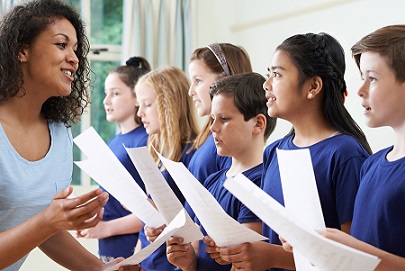
Describe a subject you enjoyed studying at school.
You should say:
- when and where you started studying it
- what lessons were like
- what made it different from other subjects
and explain why you enjoyed the subject.
There There were three subjects I particularly enjoyed at school, English , geography and P.E. but if I had to choose a favourite, I guess it would be geography .
I suppose you start learning about the natural features around you and other countries in primary school but geography first appeared on the curriculum as a specific subject in secondary school . I’d been fascinated with other places and cultures for as long as I could remember. My dad had travelled a lot and had a large map on the wall with pins in all the countries he’d been to. I loved looking at it so perhaps that’s where my interest in geography first started.
The geography classroom was great; full of globes, atlases and books about places that were very different to where I lived. We had a nice teacher called Mrs Rose who used lots of pictures and maps in her lessons . This was perfect for me as I’m a visual learner. If Mrs Rose had just talked all the time, as some of our teachers did, I probably wouldn’t have enjoyed the subject so much or learnt so easily.
I even liked doing geography homework . I can remember sitting at my desk at home spending hours carefully drawing maps and adding all the features. When my mum took me to the library on a Saturday morning, I’d look for adventure stories set around the world or books on how people live in other countries.
When I reached the sixth form and had to choose just three subjects to study, geography was one of them, although I actually failed my final exam. My family moved house yet again just before I took it and I was very unsettled. I had a private tutor for a few months then retook the exam and got a good grade.
At university , I trained as a teacher myself. I chose primary education so taught geography along with many other subjects. However, during one of my training placements, the headteacher asked me to spend three weeks teaching the subject to every class in the small village school, from 5 year olds up to 11 year olds. It was one of the happiest times in the whole of my career even though I hadn’t even got my teaching qualification yet.

1) What impact do universities have on the places where they’re located?
I believe that the presence of a university in a town or city has a significant positive impact on the area. For a start, it's often the largest employer, offering jobs at all levels from cleaners and maintenance staff to lecturers and top academics .
Large educational institutions like this bring in lots of investment from around the world from foreign students and for important research projects. The presence of thousands of students during term times is also a massive boost to the local economy.
In addition to the financial benefits, there several ways in which universities contribute socially. For example, university towns and cities tend to be vibrant, with a great social life due to the large numbers of young adults living there. What’s more, the campus itself usually has a number of facilities that can be used by local people. A university city I used to live in had an excellent theatre that attracted top plays, shows and performers from around the country.
2) What is it more important for academics to do, research or teaching?
It was only recently, after reading an article about a local university , that I realised just how much research goes on in them. It was about a new facility in the medical faculty and outlined the important research they will now be able to carry out on stem cells and brain tumours. This type of work is vital if we are to combat illness and disease in the future.
For most people though, universities are places of learning where you go to get your degree and prepare for your future career, so teaching must have a high priority. As teachers , academics have the role of passing on knowledge to the next generation.
Weighing it up, I think that the teaching side of their work is the most important because unless they instruct and inspire their students , there will be no-one to fill the most important jobs in society or to carry on the research work the academics do.
3) What are the advantages of studying a distance learning course?
For many people, especially mature students who work, distance learning is the ideal way to study. There are several benefits that immediately come to mind. Firstly, the cost is far less than it would be to attend a college or university with their high tuition fees .
Secondly, you can study anywhere and in your own time and at your own pace. Some students , myself included, find that this method of learning suits them better than sitting in lectures or going to tutorials . You do have to be self-motivated to keep up with the coursework though, and you still get assignments to write and sometimes a dissertation , but you can fit these around your daily life.
Thirdly, there’s a huge range of correspondence courses and online courses available these days so you can take almost any subject you want to and even study for a degree qualification this way. So all in all, distance learning courses have many advantages over other methods of study.

Click this link to get a PDF download of these practise questions & sample answers.
Download PDF Now
* Important
- Do not try and learn this list of education vocabulary.
- Identify the vocabulary you find useful for answering practise questions about this topic.
- Record it in your vocabulary notebook and practise using it regularly.
I recommend that you create your own answers to the Speaking questions on this page. You will find many other IELTS-style practise questions by searching online.
For help on how to learn vocabulary, what to learn and how to record it, visit these pages:
How to Learn Vocabulary for IELTS
Top 6 Types of IELTS Vocabulary & Topic Word Lists
Education Vocabulary – Common Words & Phrases
Education Vocabulary Set 1: Key Definitions
education – the process of teaching or learning, especially in a school, college or university, or the knowledge that you get from this
- Education is a low priority for the governments of some developing countries.
- Most children receive their education in schools but some are taught at home.
to educate – to give someone intellectual, moral or social instruction, typically at a school, college or university
- At the school I visited in Kenya the children are educated in classes of over 60 pupils.
educational – relating to the provision of education
- When I was at school we had an educational visit to the British Museum in London to see Tutankhamun’s treasures.
educational institution – a place where people gain an education, such as a school
- We are fortunate to have many excellent educational institutions in our area.
formal education – education normally delivered by trained teachers in a systematic way in a school, college or university.
- In Norway, formal education starts when children reach the age of six.
compulsory education – the legally-required period of time that children are expected to attend school. In the western world, these laws generally require that children attend school from the ages of 5 to 16 or 18.
- One day, a formal education will hopefully be compulsory for all children.
Education Vocabulary Pronunciation
Education Vocabulary Set 2: Educational institutions
preschool – a school for children who are too young to begin their formal education
- Most children in the UK go to a preschool but it isn’t compulsory.
nursery school (UK)/ kindergarten (US) – preschool education
- In the UK, most children begin nursery school at the age of four.
primary school (UK)/ elementary school (US) – the type of school for children ages 5-11
- Bindi was so excited about starting primary school when the new term started in September.
primary education – the education of 5-11 year olds
- In an ideal world, primary education would be compulsory in every country.
secondary school (UK)/ high school (US) – the type of school for children age 11 to 16, sometimes 18
- I want to teach in a secondary school when I finish my teacher training as I really enjoy working with older pupils.
co-educational/mixed – a school where girls and boys are taught together.
- These days, most schools in the UK are co-educational .
single-sex school – a school for either male or female students but not both
- Both my parents went to single-sex schools but it’s more normal these days to go to a mixed school.
state school – a school that is funded and controlled by the government and for which no fees are charged
- The government is facing growing criticism for the underfunding of state schools .
comprehensive school – a state school that accepts pupils regardless of their level of academic ability or achievement
- There is an ongoing debate as to whether all young people should attend comprehensive schools or if schools that select pupils on academic ability are still relevant.
grammar school (UK) – state secondary school that selects their pupils by means of an examination taken by children at age 11
- Although many people are against selective education where some school places go to the most academically able pupils, grammar schools are still popular.
private school – a school that is not supported by government money, where education must be paid for by the children’s parents
- Jonah’s parents decided to pay for him to go to a private school because most classes only had 20 pupils in.
private education – education parents have to pay for
- Only a small percentage of parents can afford to give their children a private education .
public school (UK) – an exclusive, expensive school, run independently
public school (US) – a school which is free and paid for by the government
higher education (also called tertiary education ) – education beyond the age at which it is compulsory, usually in a college or university
- Most of Vijay’s friends wanted to leave school and get a job as soon as possible but he was determined to go on to higher education to improve his career prospects.
boarding school – a school where students live and study during the school term.
- Yu Yang hated boarding school as she missed her family and felt very homesick.
college – a place of higher education where people study specialized subjects or undertake vocational training for a skilled job
- Hugo applied for a place at the local college to train to be a chef.
university – a high-level educational institution where students study for degrees and academic research is done.
- Fuyuko wanted to study nursing at university in Australia but had to get a band 7 in her IELTS exam to be accepted.
Education Vocabulary Pronunciation
Education Vocabulary Set 3: Course types & levels
course – a series of lessons in a particular subject
undergraduate – studying for a degree but having not yet achieved it.
postgraduate – having achieved a degree and now studying for a higher qualification, possibly a professions qualification
vocational – education or training directed at a particular occupation and its skills, often requiring practical skills
intensive – fast-paced courses which give a lot of information quickly and in a short time
Education Vocabulary Set 4: Qualifications
qualification – an official record showing that you have achieved a certain level of education or skill in a particular subject or skill area
- Riya was determined to leave school with good qualifications so she could get a well-paid job to support her family.
certificate – an official record of achievement, generally issued for a short course
- Shona was delighted to be presented her TEFL certificate on passing her course to become an English teacher.
diploma – issued for a higher education course that is shorter than a degree
- Greg did so well in his two-year engineering diploma that his tutor persuaded him to study for another year to qualify for a degree.
bachelor’s degree / or just degree ( BA/BSc etc) – qualification issued by a university or college at the end of three or four years of study
- I’m studying for a bachelor’s degree in marine biology.
- I’m studying for a BA in history.
master’s degree /or just master’s ( MA/MSc etc) – qualification issued by a university when the student has completed further study beyond a degree, often in a more specialisn'ted field than a bachelor’s degree
- Alonso wanted to stay on at university an extra year to study for his master’s but his parents couldn't afford the fees.
doctorate ( PhD ) – the highest level of degree qualification issued by a university
- I’m so proud of my sister for achieving a PhD in biochemistry.
fellowship – a teaching or research post given to a person studying for an advanced degree.
- Being awarded a research fellowship at my university is a dream come true as it enables me to stay on and study for my doctorate.
Education vocabulary Pronunciation
Education Vocabulary Set 5: People in education
headteacher/ principal – the person in charge of a school
- Our headteacher had been principal for 12 years when he retired.
teacher – a person who teaches, especially in a school
- My favourite teacher at school was Mr Webber because he made lessons so interesting.
tutor – a teacher who works privately with one student or a small group
- Our son struggles with maths so we’ve got him a private tutor to help him with his work.
lecturer – a person who teaches at a college or university.
- My cousin is a lecturer in physics at the University of London.
professor – a teacher of the highest rank in a department of a British university, or a teacher of high rank in an American university or college
- Professor Stephen Hawking was one of the most influential figures in modern science.
an academic – a person who teaches in a college or university and continues to research and increase knowledge about their specialist subject
- She was such a bookworm at school and always in the library researching some topic or other, so it’s no surprise that she became an academic .
pupil – a person, usually a child at school, who is being taught
- The pupils loved Miss Lefebvre’s French lessons as she gave them fun learning games to play.
student – a person, usually a college or university, who is being taught
- The beginning of the academic year was so busy with all the new students starting their college courses.
mature student – an adult student who attends college or university some years after leaving school
- Jose was so grateful for the chance to study for a degree as a mature student having left school with very few qualifications.
a graduate – a person who has finished their college or university education
- University graduates can usually get higher paid jobs than people with vocational skills.
peer – a person who is in the same class, age group or social group as someone else
Pupils these days are under a lot of pressure to dress and behave like their peers .
Education Vocabulary Set 6: School subjects
curriculum – the subjects comprising a course of study in a school or college
- Her parents chose the school because it offered a broad curriculum including drama and dance which were her favourite subjects.
syllabus – an outline or summary of the subjects to be covered in a course
- The new syllabus included environmental science which was becoming more popular as a school subject.
maths/math/mathematics – the study of numbers, shapes and space
literature – the study of written works (such as poems, plays, and novels) that are considered to be very good and to have lasting importance
the three R's – the basic educational skills of r eading, w r iting and a r ithmetic (maths)
- Most schools put a high priority on teaching the three R's .
language – a system of communication used by a particular country or community often studied as a subject by non-native speakers
- To her surprise, Jenna found that she was quite good at languages at school.
humanities – studies about human culture, such as literature, languages, philosophy, and history.
- Tuma couldn’t decide whether to study history or philosophy at university so opted for a degree in humanities .
science – the study of the structure and behaviour of the physical world, divided into subjects such as physics, biology and chemistry
- physics – the branch of science concerned with the nature and properties of matter and energy
- biology – the study of living organisms
- chemistry – the branch of science concerned with the substances of which matter is composed
geography – the study of the physical features of the earth and its atmosphere, and of human activity as it affects and is affected by these
religious studies – the study of religion and belief systems
history – the study of past events, particularly in human affairs
information technology (IT or ICT) – the study of the development, maintenance, and use of computer systems, software, and networks for the processing and distribution of data
physical education (PE) – instruction in physical exercise and games, especially in schools
art – the study of artistic techniques such as drawing, painting, sculpture, etc. or the appreciation of works of art
music – the study of how to play a musical instrument or sing, how to read music, how to compose music, etc
drama – the study of acting and theatrical performance
home economics – cooking and other aspects of household management, especially as taught at school
Education Vocabulary Set 7: School vocabulary
to play truant – to be absent without permission from parents or teachers
- Helios was always playing truant from school which he regretted when he failed his exams and struggled to find a good job.
to skip classes – to be absent from lessons you are supposed to attend
- I was never brave enough to skip classes as my parents would have been furious if they’d found out.
bookworm – a person who loves reading and/or studying
- My best friend is a real bookworm but is a great person to have on your quiz team because his general knowledge is excellent.
rote learning – a teaching style based on learning by memorisation through repetition
- My parents’ education was based on rote learning but there was more emphasis on learning by investigation by the time I went to school.
literacy – the ability to read and write, sometimes use as a subject title for reading and writing
- Afghanistan has one of the lowest literacy rates in the world with just 28% of people able to read and write.
literate – to be able to read and write
- In the past 20 years, the proportion of adults in the world who are literate has increased from 75% to 84 % which is a great improvement.
illiterate – to be unable to read and write
- There are many children in the poorest countries of the world who have little or no access to education and are illiterate .
remedial – involving pupils who need extra help with a particular area of study or subject
- Pupils who got poor grades use to be put in a remedial class but now they are given extra support from a learning assistant.
additional needs/ special needs – related to students who need special help due to a learning or physical difficulty
- Shona spend the later part of her teaching career working in a school for students with additional needs .
extra-curricular activities – activities or subjects offered in addition to the normal curriculum usually offered outside normal class hours, such as art, cooking or computer clubs and extra sporting activities
- The most popular extra-curricular activities at Westcroft School were pottery, badminton and computer programming.
school uniform – a particular set of clothes that has to be worn by pupils
- Do Hyan looked so smarting setting off for school on his first day wearing his new school uniform .
discipline – a set of rules governing conduct or behaviour
- Schools where a high level of discipline is maintained, generally have above average exam results
- impose discipline
- maintain discipline
- lack of discipline
timetable – a chart showing times of particular events, such as lesson times in the school day
- Ruby wasn’t very happy with her new timetable as she had double maths followed by double science on a Monday, both subjects she found hard.
Education Vocabulary Set 8: Facilities
classroom – where lessons take place in a school
- The noisy classroom fell silent when the headteacher walked through the door.
lecture theatre/ hall – a room or hall for lectures with seats in tiers
- There was excitement in the lecture theatre as the famous actor stood up to give the drama students a lecture on method acting.
studio – a room where students studying art, photography, media studies, etc. create work
- The studio was set up with recording equipment for the students to practice editing techniques.
library – a building or room containing collections of books, professional journals and other academic literature and material relevant to student's studies
- Sabiha spent all day in the university library doing research for her essay on globalisation.
laboratory – a room or building with scientific equipment for doing scientific tests or for teaching science
- Kate’s favourite part of her degree course in molecular biology was the laboratory work.
campus – the buildings and grounds of a university or college
- It took me a long time to find my way around the campus when I first started at university.
halls of residence – a college or university building where students live
- In his first year at college, Somchai lived in a hall of residence , but in his second year, he rented a house with some other students.
student accommodation – living accommodation for college or university students
- The university offered a range of student accommodation including studio apartments, flats, halls of residence and shared houses.
Education Vocabulary Set 9: Academic work
assignment – a piece of work given to someone as part of their studies
- I have three more written assignments to complete this term.
coursework – written or practical work done by a student during a course of study, often assessed in order to count towards a final mark or grade
- Helga was really bad at exams so she chose a course where 50 per cent of the overall marks came from assessed coursework .
dissertation – is a long formal piece of writing on a particular subject, especially for a university degree.
- It was hard getting my dissertation finished by the deadline and I handed it in on the very last day.
thesis – a long piece of writing on a particular subject, especially one that is done for a higher degree
- Adao wrote his PhD thesis on the effect of organic fertilizers on soil fertility in tropical climates.
presentation – a speech or talk given in front of an audience
- As part of their end of year assessment, the students had to give a presentation on the theories of learning for children under 3 years of age.
lecture – a formal talk on a subject given to a large group of students who would normally take notes
- She was so pleased that the lecture was cancelled as it gave her time to catch up on some coursework.
tuition – teaching or instruction, especially of individual pupils or small groups
- Dana was unable to get to lectures after breaking her leg but the college provided individual tuition for her until she recovered.
tutorial – a small group study session with a tutor often following a lecture
- He always found tutorials helpful as it was a chance to ask questions about what they’d heard in the lecture.
seminar – a class at university in which a specific topic is discussed by a teacher and a small group of students
- At university, I found seminars far more useful than lectures as I learn best in a small group.
lesson – a period of learning or teaching, usually in a school
- Walter was late for the history lesson and got into trouble with the teacher.
homework – additional coursework work given to pupils to complete in their own time outside school hours
- Most pupils hate homework as they’d rather be out with their friends or playing computer games than studying.
correspondence course – a course of study in which student and tutors communicate by post
- Juan’s local college didn’t offer a course in accountancy but he found a good correspondence course to give him the qualification he needed.
distance learning – a way of studying in which lectures are broadcast or lessons are conducted by post or via the internet without the student needing to attend a school or college or have in-person teacher interaction
- I prefer to study by distance learning as I can work when I want and at the pace I want.
online learning – Similar to distance learning but done 100% via the internet and often involving in-person interaction with a teacher online
- I find online learning ideal for preparing for my IELTS exam and enjoy connecting with my teacher via Skype.
to sit an exam – to take an exam.
- I want to carry on learning for the rest of my life but after I finish my training I hope I never have to sit an exam again.
Education Vocabulary Set 10: The cost of education
tuition fees – the money paid for a course of study, especially at a private school or a college or university
- High tuition fees mean that many young people can’t afford to go to university.
a grant – money given by the government to support a student while studying
- Bernice was successful in her application for a grant which meant that she could attend her local university.
a student loan – money which a student can borrow while they are studying, but which has to be repaid
- Geraint took out student loans of £9000 a year to pay for his tuition of fees and left university heavily in debt.
a scholarship – money given to someone, often by the institution they are studying at, to help pay for their tuition
- He was overjoyed to receive a scholarship to Oxford University as his parents couldn’t afford to pay the fees.
internship – a period of work experience (often unpaid) offered by an employer to give students and graduates experience of working in an industry related to their field of study
- All students on the course were expected to secure an internship during the long vacation between the second and third years of their degree course.
Education Vocabulary Set 11: Common terms related to college or university
unconditional offer – the offer of a place at an educational institution for which you already meet the entry requirements
- Mustafa was delighted to receive an unconditional offer from his first choice university and accepted immediately.
conditional offer – the offer of a place at an educational institution which requires you to meet certain entry requirements, usually specific exam grades
- She was fairly confident that she would get the exam grades she needed to take up the conditional offer at Bristol University.
to major in – to choose as your main subject
- I want to major in primary education with a specialism in science.
to read (a subject) – to study a specific subject
- Hans read geology at university and is now working for an oil company in the States.
faculty – department in a university that specialises in a specific subject
- It was a proud day for the university when the faculty of science move into the new, state-of-the-art building.
research – a detailed study of a particular subject
- I’m really enjoying this research project on the migratory behaviour of the golden eagle.
- conduct research
- carry out research
Education Vocabulary Set 12: More common words, phrases & expressions
to work your way through university – to have a paid job while studying to support yourself financially
- With the steep increase in tuition fees, many students are forced to work their way through university .
to keep up with your studies – to not fall behind with your work
- Giang would have to limit his time socializing with his friends if he was going to keep up with his studies .
to fall behind with your studies – to not get your coursework and assignments done in the time allowed
- She was a hard-working student but fell behind with her studies after catching pneumonia and having to spend time in hospital.
to learn something by heart – to memorise it
- By the end of his first week learning English, Elisha had learnt all the days of the weeks and months of the year by heart .
gap year – a period, typically an academic year, taken by a student as a break between school and university or college education
- Many students spend their gap year travelling to get more experience of life before they settle down to studying for a degree.
to take a year out – to take a gap year
- Before going to the university, I took a year out to travel and also earn some money.
to enrol – to officially register on a course at a college or university
- She didn’t know an old friend had enrolled on the same course until they met up on the first day.
sign up for – to commit to something for a specific period such as the duration of a course
- Having signed up for the photography course, she now had to ask her brother if she could borrow his camera.
to drop out – to leave a course before completing it
- Hiran was forced to drop out of university when his father became ill and he had to take over the family business to support his family.
a dropout – a student who fails to complete a course of study and leaves the educational institution with no qualifications
- Many famous and very wealthy entrepreneurs are college dropouts , which proves that you don’t need a degree to succeed in life.
well-educated – someone who has received a high level or good standard of education
- You could tell that he was well-educated by the way he spoke.
to meet a deadline – to complete a piece of work by the required date
- I didn’t think I’d get my essay written in time but I just met the deadline .
note-taking – to take notes in a lesson or lecture when the teacher is talking
- I find note-taking in a lecture really difficult as I miss much of what is being said while I’m writing.
to revise – study or read something again in order to remember it better, often before exams
- No matter how hard I revise , my mind goes blank as soon as I get into the exam room.
to review – to read over something again. Similar to revise, but generally done just after a lesson or lecture rather than in preparation for an exam
- Bella found that reviewing her notes just before going to sleep helped her to remember the key points.
workload – the amount of work that has to be done
- The course workload felt overwhelming at first but became more manageable once the students had covered the theory and moved on to the more practical part of the course.
to pass with flying colours – to pass an exam or test easily and with excellent result
- He was sure he was going to fail his maths exam but passed with flying colours .
scrape through – to just pass an exam
- She ran out of time in the exam and left many questions unanswered but just scraped through with a pass mark.
to resit/retake an exam – to take an exam again in order to get a better result
- Madee needed band 7 in her IELTS Speaking test but only got 6.5, so she had to retake the exam .
Click this link to get a PDF download of this list of education vocabulary.
Other Useful Education Vocabulary
It’s also a good idea to create your own list of education vocabulary related to any courses you are currently taking so that you are ready to talk about them if asked.
Ways to Improve Your Education Vocabulary
One of the best ways to improve your vocabulary is through reading. Watching topic related YouTube videos and listening to podcasts is also hugely beneficial.
Here are some online resources I recommend.
Education Articles
BBC News – Education
The Independent
New York Times
The Conversation
I love TED Talks. They are short videos with a powerful message and are generally very interesting. They’re ideal for improving your vocabulary and give valuable listening skills practise.
Search YouTube TED Talks - Education to help you improve your education vocabulary.
All Topic Vocabulary

Would you prefer to share this page with others by linking to it?
- Click on the HTML link code below.
- Copy and paste it, adding a note of your own, into your blog, a Web page, forums, a blog comment, your Facebook account, or anywhere that someone would find this page valuable.
Like this page?
- IELTS Vocabulary
- Back To Top
* New * Grammar For IELTS Ebooks

$9.99 each Full Set Just $ 23.97
Find Out More >>
IELTS Courses

Full details...

Vocabulary Topic Packs
Learn vocabulary for common topics while getting valuable practice answering the different types of IELTS questions.
Just $5 each
Find out more >>
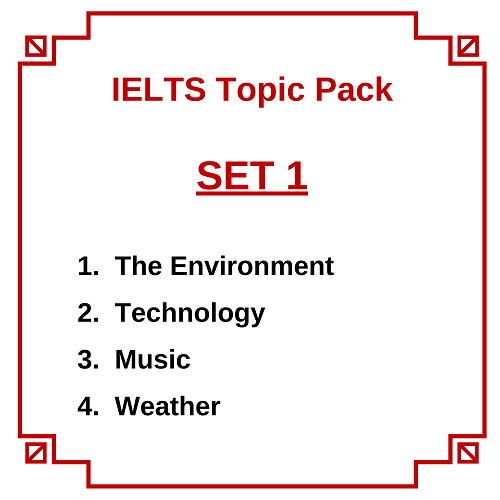
Testimonials
“I am very excited to have found such fabulous and detailed content. I commend your good work.” Jose M.
“Thanks for the amazing videos. These are ‘to the point’, short videos, beautifully explained with practical examples." Adari J.
"Hi Jacky, I bought a listening book from you this morning. You know what? I’m 100% satisfied. It’s super helpful. If I’d had the chance to read this book 7 years ago, my job would be very different now." Loi H.
"Hi Jacky, I recently got my IELTS results and I was pleased to discover that I got an 8.5 score. I'm firmly convinced your website and your videos played a strategic role in my preparation. I was able to improve my writing skills thanks to the effective method you provide. I also only relied on your tips regarding the reading section and I was able to get a 9! Thank you very much." Giano
“After listening to your videos, I knew I had to ditch every other IELTS tutor I'd been listening to. Your explanations are clear and easy to understand. Anyways, I took the test a few weeks ago and my result came back: Speaking 7, listening 9, Reading 8.5 and Writing 7 with an average band score of 8. Thanks, IELTS Jacky." Laide Z.
Contact
About Me
Site Map
Privacy Policy
Disclaimer
IELTS changes lives.
Let's work together so it changes yours too.
Copyright © 2024 IELT Jacky
All Right Reserved
IELTS is a registered trademark of the University of Cambridge, the British Council, and IDP Education Australia. This site and its owners are not affiliated, approved or endorsed by the University of Cambridge ESOL, the British Council, and IDP Education Australia.
- IELTS Scores
- Life Skills Test
- Find a Test Centre
- Alternatives to IELTS
- Find Student Housing
- General Training
- Academic Word List
- Topic Vocabulary
- Collocation
- Phrasal Verbs
- Writing eBooks
- Reading eBook
- All eBooks & Courses
- IELTS Vocabulary
Education Vocabulary for IELTS
This is a list of useful Education vocabulary for IELTS.
Education is common topic in IELTS. This vocabulary will help you with all parts of the test if the topic arises.
As with the other vocabulary on these pages, although common word forms are given, not all word forms are here, so remember that once you understand the word you should study it further to make sure you understand exactly how it is used in different contexts.
You will see here:
- The word/phrase
At the bottom of the page you will find links to essays connected to education topics.
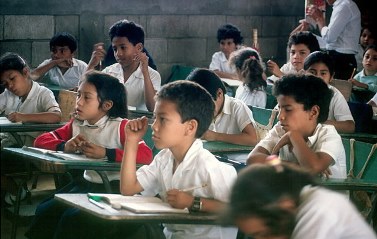
List of IELTS Education Vocabulary
The action or state of going regularly to or being present at a place or event.
- Attendance is mandatory for all students during the school term.
- Regular attendance is important for academic success.
To behave in a dishonest way in order to get what you want.
- He did really well in his exams but he cheated. He copied from a friend.
- Cheating on exams is not recommended.
Co-educational
When male and female students are taught together in the same school or college rather than separately
- I believe that co-educational schools prepare students for their future better than single-sex schools.
- Co-educational schools provide an inclusive environment where boys and girls learn together, fostering mutual respect and understanding.
Concentrate
To direct your attention or your efforts towards a particular activity, subject, or problem.
- It is difficult to concentrate on my college work if there is a lot of noise.
- I keep losing concentration due to the noise.
Regular work done by students as part of a course, but assessed independently of formal exams.
- The coursework on my degree was really difficult.
- The coursework for my biology class includes conducting experiments, writing lab reports, and completing research assignments.
The group of subjects studied in a school, college, etc.
- Schools must ensure they have an excellent curriculum.
- The school's curriculum includes a diverse range of subjects such as mathematics, science, literature, and physical education to provide students with a well-rounded education.
Distance Learning
Education that takes place remotely, often utilizing online resources and communication technologies.
- Many universities offer distance learning programs for students who are unable to attend classes on campus.
- The pandemic led to a surge in popularity for distance learning platforms.
Extracurricular
Activities pursued by students outside the regular curriculum.
- I participate in several extracurricular activities like debate club and chess team.
- Extracurricular activities help students develop a well-rounded skill set.
To complete a first university degree successfully.
- I graduated from the University of Salford in 2009.
- My graduation ceremony was in 2009.
Higher (tertiary) Education
Non-compulsory education after finishing school, such as university, as well as vocational education and training at colleges.
- 60% of children now go into higher education after they finish school.
- After completing secondary school, many students choose to pursue tertiary education at universities or colleges to further their academic and career goals.
Tasks assigned by teachers to be completed outside of class.
- I have a lot of homework to do tonight, including a math worksheet and a history essay.
- Homework reinforces what we learn in class.
Unable to read and write.
- Many children in the poorest countries are illiterate.
- Due to the lack of access to education, many adults in the rural village remained illiterate, unable to read or write even basic texts.
The ability to read and write.
- Literacy rates have declined considerably in Western countries over the last decade.
- However, most children are literate.
The practice of taking someone else's work or ideas and passing them off as one's own.
- Plagiarism is a serious offense in academic settings and can result in disciplinary action.
- The student was expelled for plagiarizing an entire research paper.
Primary Education/School (Elementary School)
First years of formal education from around age 5 to 11.
- A good primary education is crucial for a child's development.
- Elementary school teachers focus on building foundational skills in reading, writing, and mathematics to prepare young students for future academic success.
Qualification
An official record showing that you have finished a training course or have the necessary skills, etc.
- Good qualifications are really important if you want to get a well-paid job.
- I am qualified to teach English.
Secondary Education/School (High School: USA)
Education during the time as a teenager.
- I loved it at my secondary school as I had so many friends.
- In secondary school, students typically study a broader range of subjects in preparation for higher education or vocational training.
A division of the academic year, typically lasting several months, during which classes are held.
- We have finals at the end of each semester.
- The fall semester begins in September and ends in December.
A sum of money charged for teaching or instruction by a school, college, or university.
- The university increased tuition fees by 10% this year.
- Many students rely on scholarships to help cover their tuition costs.
Undergraduate
A student at a college or university who has not yet earned a bachelor's degree.
- I'm an undergraduate majoring in biology.
- Undergraduate students often take a variety of general education courses.
Virtual Classroom
An online learning environment where students and teachers interact in real-time.
- Due to the pandemic, we shifted to a virtual classroom for the remainder of the semester.
- The virtual classroom allows students to participate in discussions from anywhere with an internet connection.
A seminar or series of meetings for intensive study or training in a particular subject.
- I attended a writing workshop to improve my essay skills.
- The workshop on time management was very informative.
View model essays that include IELTS education vocabulary:
University Education Essay
Free University Education Essay
Paying Attention in Class Essay
Examinations or Formal Assessment Essay
More Topic Related Vocabulary:

Science Vocabulary for IELTS
Science vocabulary to improve your score for the IELTS test. Learn words that can be used in the test, with examples and definitions.

Information Technology Vocabulary for IELTS
Learn information technology vocabulary, which provides you with a new word, a definition, and then the word in context.

Health Vocabulary
This health vocabulary includes useful words to talk and write about health, ftiness and food

Children and the Family Vocabulary
Children and the Family Vocabulary for IELTS - essential vocabulary to help to improve your score for IELTS

The Arts Vocabulary
Learn about the Arts vocabulary to help you in the IELTS test for speaking, writing, reading and listening.

Work Vocabulary for IELTS
Work vocabulary to improve your IELTS score. The words are related to the topics of jobs, careers and occupations.

Environment Vocabulary for IELTS
Environment vocabulary words and definitions that you can learn in order to increase your score for the IELTS test.

Crime Vocabulary for IELTS
Crime vocabulary to help you with IELTS essays and speaking. Common Crime Words.
Any comments or questions about this page or about IELTS? Post them here. Your email will not be published or shared.
Before you go...
Check out the ielts buddy band 7+ ebooks & courses.

Would you prefer to share this page with others by linking to it?
- Click on the HTML link code below.
- Copy and paste it, adding a note of your own, into your blog, a Web page, forums, a blog comment, your Facebook account, or anywhere that someone would find this page valuable.
Band 7+ eBooks
"I think these eBooks are FANTASTIC!!! I know that's not academic language, but it's the truth!"
Linda, from Italy, Scored Band 7.5

IELTS Modules:
Other resources:.
- All Lessons
- Band Score Calculator
- Writing Feedback
- Speaking Feedback
- Teacher Resources
- Free Downloads
- Recent Essay Exam Questions
- Books for IELTS Prep
- Student Housing
- Useful Links

Recent Articles
Alternatives to the IELTS Exam
Mar 22, 24 12:32 PM
Common Questions about the IELTS Speaking Test
Mar 09, 24 05:28 AM
IELTS Computer Delivered Practice Tests Plus Band Score
Mar 01, 24 02:38 AM
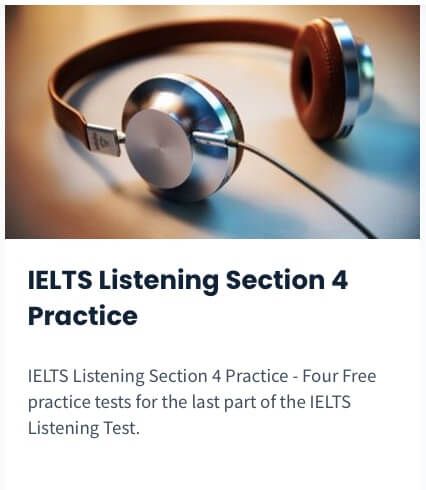
Important pages
IELTS Writing IELTS Speaking IELTS Listening IELTS Reading All Lessons Vocabulary Academic Task 1 Academic Task 2 Practice Tests
Connect with us
Copyright © 2022- IELTSbuddy All Rights Reserved
IELTS is a registered trademark of University of Cambridge, the British Council, and IDP Education Australia. This site and its owners are not affiliated, approved or endorsed by the University of Cambridge ESOL, the British Council, and IDP Education Australia.
- TOEFL Writing Correction Topics
- OET Course & Mock Test
- Writing Correction
- Speaking Mock Test
- Reading Course
- Listening Practice Tests
- FREE Practice Tests
- OET Writing Correction
- OET Reading Course
- OET Speaking Mock Test
- TOEFL Writing Correction
- PTE Writing Correction
- OET Listening Practice Tests
- OET (Occupational English Test)
- PTE (Pearson Test of English)
IELTS Vocabulary – Education
- Finance & Money
- Communication
- Climate Change
- Social Media
- Entertainment
- Transportation
- Environment
- Crime and Policing
- IELTS Vocab

Education and schools is a common topic of discussion both in general life and in the IELTS test. This article provides you with the required vocabulary for the IELTS exam. This section is focused on the words related to education, schools, and studying. The IELTS vocabulary is divided into different sections and there are exercises for you to practice what you have learnt.
1. School Subjects
The vocabulary given below is applicable in both writing and speaking sections.
You may be asked speaking cue-card, such as what was your favorite subject at school?
Similarly, the essay topic could be – Some people believe schools should teach science and mathematics only. Do you agree or disagree?
- mathematics / math’s (UK) / math (USA)
- physical education (PE)
- IT ( Information technology)
** School subjects are not capitalised unless they are proper nouns such as languages. However, if you are mentioning a specific class or course title then you should use a capital letter. For example, Calculous 3 or The Ancient History of Peru would both require capital letters.
2. Educational Establishments
- Kindergarten / Pre-school / Nursery (UK) – Below 5 years
- Primary school (UK) / Elementary school (USA) – 5-11 years
- Secondary school (UK) / High school (USA) – 11 – 16
- College – In the UK a college can be attended from 16 years upwards and offers further education courses that are not usually of degree level. In the US a college offers degrees and would be known as a university in UK English.
- University – 18 years and upwards
3. Higher Education Vocabulary
Below are some key nouns and verbs related to university and higher education.
- Apply for Harvard – To submit an application to study Harvard
- BA – Bachelor of Arts
- BSc – Bachelor of Sciences
- Campus – The location and grounds of a university.
- Career prospects – The job opportunities a university course can provide upon graduation.
- Degree – A 3- or 4-year university course
- Dissertation/Thesis – A long essay or research project written in the final year of university.
- Distance learning – Taking part or all the course via the internet from a different location to where the school is based.
- Enroll in – To register for a course at university.
- Faculty – A university department or the members of teaching staff. The students can also be part of the faculty and are often known as ‘faculty members’.
- Give a presentation – To speak on a particular topic in front of the class and lecturers.
- Graduate – (verb) To finish university / (noun) A person who has finished university.
- Lecture / Lecturer – A class at university / The ‘teacher’ at university.
- MA / MSc – Master of Arts / Master of Sciences
- PhD – Doctor of Philosophy
- Scholarship – A payment or discount to support a student’s education, usually because the student is talented or has shown academic promise or excellence.
- Seminars – Small group classes where students and the teacher discuss topic.
- Semester – The period when university is open and giving classes
- Student loan – The financial assistance provided to university students.
- To drop out – To leave or quit university.
- To lecture in English / To give a lecture of English – To teach English / To teach an English class
- To read French – To study French at university.
- Tutorials – Small group classes or one on one classes. Often used to assist struggling students with a particular topic.
- Undergraduates – People currently studying at university.
4. Higher education vocabulary exercise – Use no more than two words from the vocabulary above to complete the sentences. You may need to change the tense of the words.
- Giving presentations
- Student loan
- Scholarship
- Dropped out
- Enrolling in
- Career prospects
- Dissertation / Thesis
5. Phrasal Verbs related to education
There are many phrasal verbs related to education’ below are some of the commonly found ones in the IELTS exam.
Be into – To be interested in a topic Fall behind – To miss deadlines or not complete work on time Hand in – To submit a piece of work Hand out – To distribute Put off – To delay something Read over – Read something from beginning to end, often to check for errors. Take in – To understand something Take up – To start learning something or engaging in an activity Type up – Transfer written notes to digital form on a computer
For more practice, visit IELTS vocabulary for communication .
Vocab articles short lists
Ielts vocabulary themes.
- Finance and Money
- Science and Technology
Leave a Reply Cancel reply
Your email address will not be published. Required fields are marked *

- ielts writing
- ielts listening
- ielts speaking
- ielts reading
- ielts practice test
- IELTS Sample Reports
- IELTS Sample Essays
- IELTS Sample Letters
- IELTS Vocabulary
Exam Updates & Tips!
Signup for preparation and special offers!
You have successfully joined our subscriber list.
IELTS Speaking
Face the IELTS Speaking exam with confidence!
IELTS Education Vocabulary
March 15, 2013 By PeterT
Topic Vocabulary >> Lesson 6: Education
You’re likely to be asked questions about your studies during Part 1, you might have to talk about a class, a teacher or a school memory in Part 2 or give your opinions on education in Part 3. Therefore, being able to call on a wide range of vocabulary to talk about education is very important.
Read the following IELTS-style questions and answers below and pay attention to the phrases in bold . Use the ‘Definitions’ section at the bottom of the page to check the meaning of any phrases you don’t understand.
Part 1-style questions
Examiner: Are you studying English at a school? Michel: Yes … I’m taking an intensive course at a local private language school … I attend classes three times a week …
Examiner: Would you say you are a good student? Susan: I’m OK I think … I’m pretty good at meeting deadlines and I’m keeping up with my studies … plus I find it quite easy to learn things by heart which is useful when learning a language …
Examiner: When you were younger did you enjoy your time at school? Theo: Yes … I liked school … it was an ordinary state school … nothing special … a single-sex school … which I’m not sure I liked … but the teachers were great … I had lots of friends and I never played truant like some pupils there …
Part 2-style task
Describe a time during your education that you really enjoyed. You should say:
- when this period was
- where you were
- what you were studying at the time
and say why you were so happy.
Caroline: I’d like to tell you about my time at university … I was a mature student … I didn’t go to university until I was 25 … and it was my first time away from my parents so it was very exciting … I was doing a Bachelors Degree and it was a bit of a challenge … some people take a year out but I’d been away from education for 8 years … plus I had to work my way through uni so I was very busy … and sitting exams at the end of each year was a new experience for me as well but I really enjoyed higher education learning about a subject I loved … history … and the social life was great as well … I don’t think I’ve ever had so many friends … I had my graduation ceremony last year in the local cathedral and I know my parents were really proud … so yes … that was a really happy time … I’m thinking of doing a Masters Degree soon … though that might be through distance learning as I have a full-time job now …
Part 3-style questions
Examiner: What qualities do you think a good teacher has? Anna: They should be patient … they should be subject specialists and be able to explain the subject clearly … they should give feedback quickly … for example not hang on to essay for ages like some of my teachers …
Examiner: What are the advantages of studying on a distance learning course? Florrie: It’s a more flexible way of studying especially if you have a job … tuition fees are usually cheaper … but you have to be very motivated … and I would imagine more people fall behind with their studies compared to face-to-face classes …
Examiner: Do all children get equal opportunities in education? Julie: In my country I think it is quite equal but in the UK I’ve heard that most people who go to the top universities have studied at public schools … you have to be very rich to study in a school like that … they’re usually boarding schools as well so the fees are enormous …
Definitions
- to attend classes : to go to classes
- bachelors degree : an undergraduate course which usually lasts 3-4 years
- boarding school : a school where pupils live during term time
- distance learning : a way of studying where tuition is carried out over the Internet or by post
- face-to-face classes : as opposed to distance learning the traditional way of studying in a classroom with colleagues and a teacher
- to fall behind with your studies : to progress less quickly than others
- to give feedback : to offer guidance on a student’s work
- a graduation ceremony : an event where a successful student receives his or her academic degree
- higher education : education, usually in a college or university, that is followed after high school or secondary school
- an intensive course : a course that offers lots of training in order to reach a goal in as short a time as possible
- to keep up with your studies : to not fall behind
- to learn something by heart : to memorize it
- a mature student : a student who is older than average and who has usually returned to education after a period at work
- masters degree : a period of study which often follows the completion of a bachelors degree or is undertaken by someone regarded as capable of a higher-level academic course
- to meet a deadline : to finish a job or task in the time allowed or agreed
- to play truant : to stay away from classes without permission
- private language school : an independent school run as a business concern
- public schools : exclusive independent schools in the UK
- a single-sex school : a school where only boys or girls attend (as opposed to a mixed-sex school)
- to sit an exam : to take an exam
- state school : a school paid for by public funds and available to the general public
- subject specialist : a teacher who has a great deal of knowledge about the subject they teach.
- to take a year out : to spend a year working or travelling before starting university
- tuition fees : the money paid for a course of study
- to work your way through university : to have a paid job whilst studying to support yourself financially
Test yourself on topic vocabulary to talk about education. Sign up to IELTS Speaking: Advanced for vocabulary tests and whole lot more!

June 9, 2016 at 3:48 am
these are very usefull for me who learn english and to take my goal ielts
thanks so much i do hope i will get more and more for learing English
March 22, 2016 at 9:56 am
Very useful, particularly the language points about fitting answers into the specific IELTS questions and the definitions.
March 18, 2016 at 8:24 am
it was really unuseful pizdec
October 3, 2015 at 3:40 pm
plz help me for my exam .
Decribe an education course you are doing. you should say: what kind of course it was. where you do it. why you do it. and explain what like and dislike about the course.
September 2, 2015 at 3:01 pm
I really like the way you present expressions, they are easy to understand into the context and apply them when talking, congrats for doing a great job and helping us to speak a foreign language. Good job!!
June 14, 2015 at 4:16 am
Thank you so much for help. I think I will be better to get good grades for the exam.
March 7, 2015 at 2:20 am
Hi. Thanks for your wealth of information. I’ve taken common IELTS vocabulary and visually represented it. It includes synonyms, antonyms, collocations and meanings. I hope you like the idea.
http://ieltsadvantage.com/category/vocabulary/
August 26, 2014 at 11:23 am
Hi Really useful 😉 Now, I can differ from various kind of school in the educational system
Thanks for helping 🙂 🙂
April 18, 2014 at 7:46 am
OVER TO YOU
Are you studying English at a school? Would you say you are a good student? What qualities do you think a good teacher has?
Use some of the vocabulary above to answer these or any of the other questions on this page.
- 5 Minute Functions
- IELTS Grammar Practice
- IELTS Speaking FAQs
- IELTS Speaking Task Sheets
- IELTS Vocabulary
- Practice Tests
- Privacy Policy
- Splendid Expressions
- The IELTS Speaking Roadmap
Social Media
We all know studying a little each day pays off and will help you get that top grade you're after. However, we all lead such busy lives and simply REMEMBERING to do this can be a challenge, never mind actually sitting down and doing the work.
Well, we'd like to give you a helping hand. Join us on Twitter or Facebook and get daily updates from us featuring a short, bite-sized exercise to help you prepare efficiently and effectively for your exam.
Twitter Facebook
Download our e-book
Sign up for our FREE ebook: 'Roadmap to IELTS Speaking Success':
Welcome Guest!
- IELTS Listening
- IELTS Reading
- IELTS Writing
- IELTS Writing Task 1
- IELTS Writing Task 2
- IELTS Speaking
IELTS Speaking Part 1
- IELTS Speaking Part 2
IELTS Speaking Part 3
- IELTS Practice Tests
- IELTS Listening Practice Tests
- IELTS Reading Practice Tests
- IELTS Writing Practice Tests
- IELTS Speaking Practice Tests
- All Courses
- IELTS Online Classes
- OET Online Classes
- PTE Online Classes
- CELPIP Online Classes
- Free Live Classes
- Australia PR
- Germany Job Seeker Visa
- Austria Job Seeker Visa
- Sweden Job Seeker Visa
- Study Abroad
- Student Testimonials
- Our Trainers
- IELTS Webinar
- Immigration Webinar
IELTS Education Vocabulary : Useful Phrases and Expressions in IELTS Speaking
Updated On Dec 17, 2021

Share on Whatsapp
Share on Email
Share on Linkedin
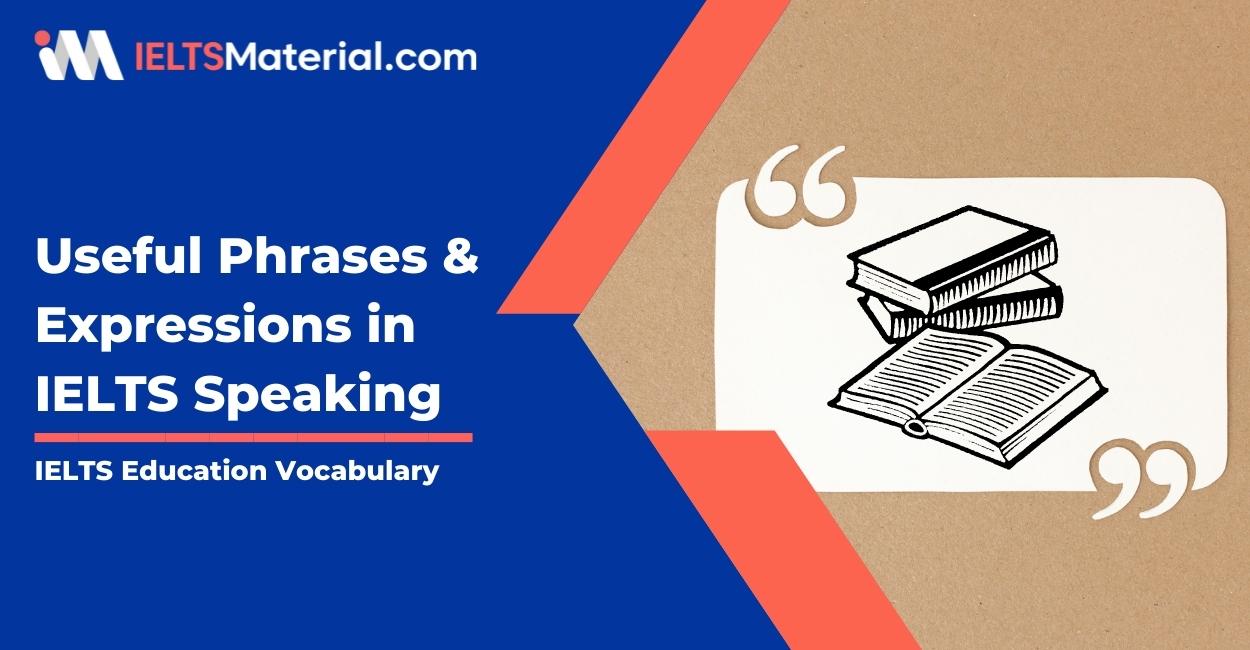
Limited-Time Offer : Access a FREE 10-Day IELTS Study Plan!
To continue the IELTS vocabulary series for IELTS Speaking , this post will cover vocabulary about education, which could be useful for you when encountering the topic in real life situation or in the IELTS exam.
Now take a look at the vocabulary sets below, and pay close attention to the details presented for each word or phrase.
Types of School
[do_widget id=custom_html-47]
School Work
Qualifications : university & college.
[do_widget id=custom_html-22]
People in Education
Benefits and drawbacks of higher education.
- Open the door to better employment opportunities
Example: It is suggested that doing master degree will open the door to better employment opportunities.
[do_widget id=custom_html-25]
- Contribute to society
Example: An increasing number of higher educated workers could have a good contribution to society in terms of economy
- Require a huge investment in term of time and money
Example: Generally, continuing higher education will require a huge investment in term of time and money.
- Lose the current job
Example: When you decide to continue higher education, you have to face the risk of loosing your current job.
Common Phrases and Idioms on education for IELTS Speaking Topic:Education
1. State school: a school paid for by public funds and available to general public
Example: Because my budget is limited, then get a scholar ship and go to state school is a great idea.
2. Private school: a school that is not supported by government money, where education must be paid for by the children’s parents
Example: A private school usually offers good educational facilities compared to a public school.
3. Higher education: education, usually in a college or university, that is followed after high school or secondary school
Example: Lisa moved to American with the purpose of continuing her higher education.
4. To work your way through university: to have a paid job while studying to support yourself financial
Example: Peter has had to work his way through university, thus he barely has free time.
5. Tuition fees: the money paid for a course of study
Example: In order to pay for the tuition fees, I have been doing many part-time jobs.
6. To keep up with your studies: to not fall behind
Example: If you want to keep up with my studies at university, you have to spend more time on self-study.
7. To fall behind with your studies: to progress less quickly than other
Example: Sara spent almost her time on going out rather than studying, which caused her to fall behind with her studies, thus she failed the exam.
8. To sit an exam: to take an exam
Example: The time when I have to sit an exam is really stressful, because I need to stay up all night and have less time to relax.
9. To attend classes: to go to classes
Example: In order to pass the final exam, it is suggested that you should attend to all of the classes.
10. Face to face classes: join in courses in classroom with colleagues and teachers.
Example: When you take part in a face to face class, you will have an opportunity to interact with teachers in person, then you can respond to the teacher immediately.
11. Distance learning: a way of studying, in which you will learn, and communicate with teachers and classmates through the internet.
Example: One benefit of taking distance learning course is the timetable will be flexible, which means you can study whenever and wherever you want.
12. To learn something by heart: to memorize it
Example: The course requires me to learn a lot of things by heart, which is quite hard for me.
13. To take a year out: to take a gap year
Example: Before going to the university, I decided to take a year out to travel to some countries.
14. A graduation ceremony: an event that successful student receive his or her academic degree
Example: a graduation ceremony is one of the most important day in a student life.
15. Gain/obtain knowledge: to acquire information and learn about a specific subject or matter
Example: Taking academic course will help students to gain a great deal of knowledge.
To extend your vocabulary sets, read articles on education and pick words or phrases that you can use on your IELTS, keep a dictionary and thesaurus handy and look for vocabulary activities on your IELTS preparation course book or online. And don’t forget to keep your vocabulary notebook (or notes) at hand whenever you’re studying for your IELTS.
What kind of school did you go to as a child?
I studied in public school all of my childhood, because at that time, the schools provided better education in comparison with private school.
What do/did you study in your university?
I studied business administration, which really suits my skills and personality.
Would you say you are a good student?
Yes, I would. I have skipped any classes, I find it easy to keep up with my studies , not to mention that my teachers usually compliment on my ability to learn quicker than other students.
IELTS Speaking Part 2 :
Sample answer .
Today I would like to share with you my memorable memories at my university. This is the time when I first moved to a big city and did my Bachelor degree in ABC University. At first, everything was new to me. I had to learn hard to keep up with my studies and spend a part of my time on doing part-time job, then worked my way through university . Although I led a hectic lifestyle at that time, I believe that it was the best time in my student’s lives, in which I joined in many clubs and activities, which gave me a golden chance to experience social lives, and make new friends.
Another thing that I remembered is when I was struggling to choose my major at university and received help from my classmates. As a junior student, my university required my to decide which major such as human resources management , accounting, finance I would follow. Having known that friends who had been studying with me for a long time might know better than me, I came to some of my friends and asked them for help. It was very kind of them that they spent time on analyzing my strengths and weaknesses, also discussing with me the pros and cons of each majors. After a few hours talking with them, I made a decision that I would go for human resources management. Now, I has been studying that major for almost 3 years and I have not ever regretted about my choice.
Through all those times, I realize that whenever I am in need, my friends are always be there for me.
What are the advantage of studying on a distance learning course?
The most foreseen benefits is that the timetable is flexible, which means students can learn anytime they want. In addition, tuition fees are likely to affordable because distance learning classes do not need to be invested in classrooms and other educational facilities. But people who take distance learning courses have to be motivated, otherwise they could fall behind with their studies.
Do all children get equal opportunities in education?
No, not really. In my country, students from well off families are likely to have better chance to study in private school with excellent facilities while this is still out of reach of few learners, because their families cannot support them.
In our next post on expanding your vocabulary for your IELTS, we’ll be looking at vocabulary related to transportation , so don’t forget to keep checking our blog!
Also check :
- IELTS Vocabulary
- IELTS Speaking preparation tips
- Linking words for IELTS Speaking
- IELTS Speaking recent actual test
- Best IELTS Vocabulary books
- Grammar for IELTS
- IELTS Listening words
- Sports Vocabulary IELTS
- English Pronunciation in use Intermediate pdf
- Work Vocabulary IELTS
- Advanced Vocabulary for IELTS
- IELTS Pronunciation Guide
- Common English words in IELTS Speaking

Start Preparing for IELTS: Get Your 10-Day Study Plan Today!
Courtney Miller
Courtney is one of our star content writers as she plays multiple roles. She is a phenomenal researcher and provides extensive articles to students. She is also an IELTS Trainer and an extremely good content writer. Courtney completed her English Masters at Kings College London, and has been a part of our team for more than 3 years. She has worked with the British Council and knows the tricks and tips of IELTS.
Improve your Vocabulary from our Vocabulary Topics

Kasturika Samanta
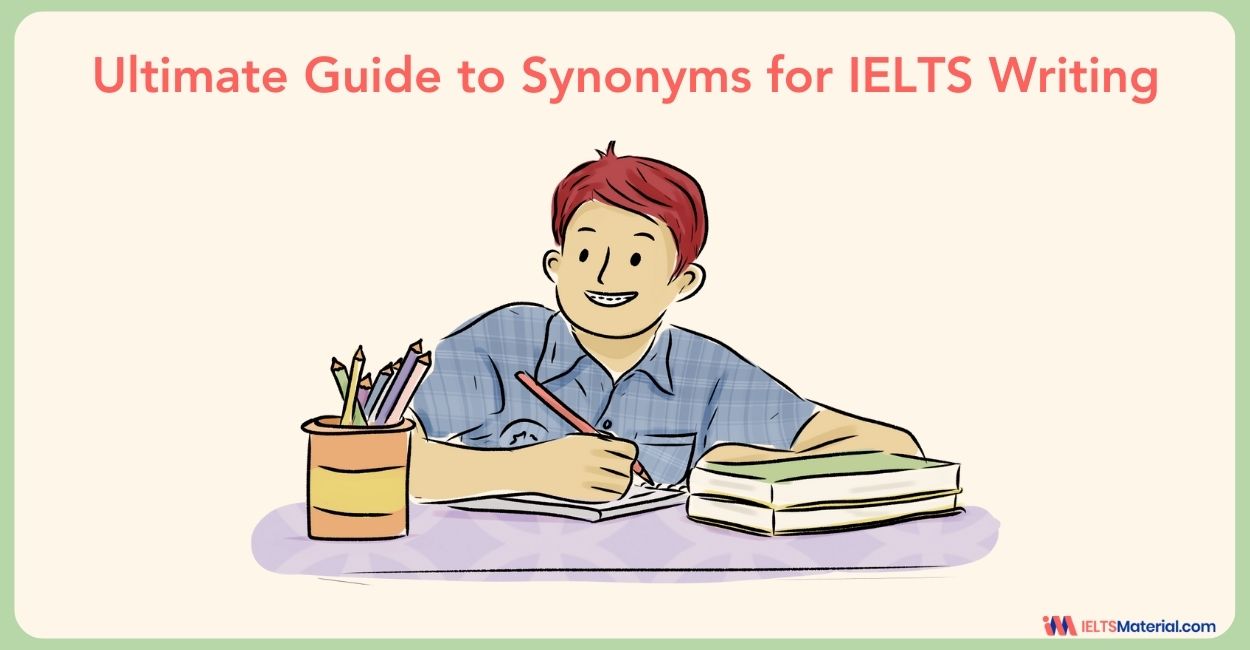
Janice Thompson

Post your Comments
Posted on Aug 28, 2016
Please check the example of phrase: “Contribute to society”.
IELTS Material
Posted on Aug 30, 2016
Thanks for your kind notice!
Recent Articles

Our Offices
Gurgaon city scape, gurgaon bptp.
Step 1 of 3
Great going .
Get a free session from trainer
Have you taken test before?
Please select any option
Get free eBook to excel in test
Please enter Email ID
Get support from an Band 9 trainer
Please enter phone number
Already Registered?
Select a date
Please select a date
Select a time (IST Time Zone)
Please select a time
Mark Your Calendar: Free Session with Expert on
Which exam are you preparing?
Great Going!

IELTS Topic-based vocabulary: education; with definitions/meanings and example sentences
This post focuses on a shortlist of some most common words used in IELTS Writing, Speaking, Reading and Listening . Here, IELTS candidates can learn and practice education- related words and phrases. All the words are given here with definitions/meanings and their use in example sentences. This vocabulary list will help you write essays and speak on education, education-related problems and their solutions etc.
Vocabulary list on ‘Education’ :
Academic year – the time of the year throughout which students attend school or university, usually considered from the beginning of the autumn term to the end of the summer term – He joined his new school at the beginning of the new academic year .
Acquire – obtain something for oneself – Hannah acquired a cheque of $500.
Admission test/entrance exam – a test designed to identify students who are capable of admitting a school or college – He obtained the highest mark in the admission test/entrance exam.
Analyse – inspect (something) systematically and thoroughly, typically in order to explain and interpret it – We need to analyse any new idea before coming to a conclusion about it.
Assignment – a specific task or amount of work assigned or undertaken by an authority – They had loads of homework assignments.
Audio – of or relating to the sound that is heard on a recording or broadcast – She listened to the audio script carefully.
Bachelor’s degree – a degree after four years’ study in a college or university – She earned a bachelor’s degree in law in 2018.
Coeducational school – a school where boys and girls study together – I studied in a coeducational school .
Cognitive – relating to conscious mental activities (such as thinking, understanding, learning and recalling) – She developed her cognitive abilities in her secondary school.
Compulsory / major – subject/subjects that you must study to obtain a degree – She had four compulsory /major subjects in her first year of Bachelor of Arts in English.
Cramming – the act of try ing to learn a lot very quickly before an exam – Cramming right before the exam is not a good idea.
Credit – a unit that represents a successfully finished part of an educational course – The students attended all the classes because each of those classes was worth two credits .
Curiosity – the desire to know about something or someone – The design of the building aroused my curiosity .
Curriculum – all the different courses offered by a school/college/university – Spanish is one of the optional foreign language on the curriculum .
Curriculum vitae / Resume – a summary of a person’s personal demographics, experience and skills – The Company has asked for complete curriculum vitae / resume of every participant.
Dean – the head of a university faculty or department or of a medical school – All the students much like the new dean after his visit to their dormitory.
Dictionary – a book or an electronic resource that catalogs the words of a particular language (usually in alphabetical order) and provides their meaning, or gives the comparable words in another language, often providing information about pronunciation, origin, and usage as additional information – I don’t have a Spanish to English dictionary .
Diploma – a qualification awarded to a student by a university or college or a high school – She’s achieved two diplomas in social work and child safety.
Discipline – a field of study – She was previously a student in science discipline at Stanford University.
Dissertation – a long piece of writing/article about a specific subject that is done to receive an advanced degree – The students submitted their dissertation on British Politics to their mentor before deadline.
Distance learning – a system of studying in which lectures are transmitted or lessons are conducted by correspondence, where the student does not need to be present at a school or college – Computer has helped enormously to spread distance learning all over the world.
Doctorate / PhD – the highest degree that is given by a university – She’s applied for a doctorate degree/ PhD in British Law in Queensland University.
Dormitory – a building or facility on a school campus where students can live – St. Gregory College has two large and separate dormitories for boys and girls.
Drop out – ditch or dump a course of study – She dropped out of college due to financial crisis.
Elementary education / primary education – the early stages of studying – We should give importance on elementary education seriously.
Encyclopedia – a book or set of books giving information on diverse subjects or on different aspects of one subject and typically arranged alphabetically – I have an encyclopedia of prehistoric animals in my collection.
Evaluation / assessment – the construction of a judgement about the amount, number, or value of something – Many education specialists resent the evaluation/assessment methods used in the prevailing education system.
Faculty – a cluster of university departments concerned with a major division of knowledge – The Faculty of Arts in Cambridge University is extremely famous.
Higher education – any of various types of education following secondary education – Universities and colleges both propose higher education opportunities for a diversity of students.
Inquisitive – tending to ask questions; having a desire to know to learn more – She seems to be quite an inquisitive woman.
Interview – a meeting of people face to face, especially for consultation – I had an interview with the board last night.
Itinerary – a designed route or journey – All the students were given an itinerary before leaving the bus.
Language skills – skills relate to diverse aspects of using language; such as listening, reading, writing or speaking – Candidates in the IELTS exam are given band-scores on their English language skills .
Lecture – an instructive talk to an audience, especially one of students or teachers in a university – Today we have to attend three lectures about social changes and demographics.
Literacy – the capability to read and write – Many countries have experienced an upward trend in their literacy rate.
Master’s degree – a one/two years’ degree after achieving a bachelor’s degree – She’s also achieved a master’s degree in law this year.
Memorise – to learn something so that you will remember it exactly – I recall clearly that some of our primary school teachers forced us to memorise some poems.
Multimedia classroom – a classroom equipped with advanced technology such as laptops, tabs, projectors, digital chalkboard etc. – Nowadays most of the schools in developed country have multimedia classrooms .
Optional / non-major – parallel to the flat surface of the horizon; at right angles to the vertical – She studied Political Science as an optional / a non-major subject in her second year.
Pedagogy – the process and exercise of teaching, especially as an academic subject or theoretical concept – A teachers’ training college is indeed a school of pedagogy .
Peer pressure – the strain of thinking about or doing something because other people in the same group do it – One of the main reasons of drug addiction is peer pressure .
Postdoctoral – a work that is done after achieving a PhD – She will go on working on a postdoctoral study in transformation of laws in the 20 th century.
Portfolio – a compilation of materials that exemplifies one’s beliefs, skills, qualifications, education, training and experiences – This portfolio presents excellent insights into her personality and work.
Practical – of or concerned with the real doing or use of something rather than with theory and ideas – I liked Mr Chao’s classes because he’d always had a practical approach to discuss a topic.
Presentation – a speech or talk in which a new product, idea, or piece of work is shown and explained to an audience – The company official has delivered a PowerPoint presentation on how to use the product.
Procrastinate – holdup or postpone an action; put off doing something – Many students fail to achieve their goal in time because they procrastinate intentionally or unintentionally.
Professor – a university scholar of the maximum rank; the holder of a university chair – The old professor passed away suddenly.
Pupil – student, one who has been taught – She had some successful pupils who keep contact with her regularly.
Put down – record something in writing – She put down the gist of the speech beautifully in her notebook.
Qualification – skill or experience or knowledge that makes someone appropriate to do a specific job or activity – All the applicants with best qualifications are requested to participate in the coming exam.
Reference – supply (a book or article) with citations of sources of information – He used reference from at least 8 prominent articles.
Research – careful study that is done to find and report new knowledge about something – This research on chimpanzees will change the course of studying animal behaviour.
Scholarship / grant – a payment made to support a student’s education, awarded on the foundation of educational or other achievement – Reeha has got a $10000 scholarship/grant for excellent academic record.
Secondary education – the stage of education following primary education – Success in secondary education is highly dependent on elementary education.
Seminar – a gathering in which people receive information on and training in a specific subject matter – They arranged a seminar on how to develop the lifestyle of rural people.
Single-sex school – a school where either boys or girls can study – My sister studied in a single-sex school .
Stipend – a particular amount of money that is paid regularly to someone – All the pupils from poor family background get a £250 monthly stipend from the school.
Survey – to ask many people a set of questions in order to gather information about most people’s insight on something – The outcome of the survey in the rural areas is quite bizarre.
Syllabus – subjects studied in a particular course – The syllabus for English Literature in developing countries is rather confusing.
Term – one of the periods into which a year is divided at school , college , or university – She finished her term in the university successfully.
Theory – a supposition or a system of proposals intended to make something clear, especially one based on general principles free of the thing to be explained – According to conspiracy theory , there is no obvious end game for countries with natural resources.
Thesis – a long original essay or dissertation involving personal research, written by a candidate for a university degree – They submitted their thesis to the professor.
Tuition fee – money that is paid to a school/college/university for the right to study there – Her tuition fee for the course is $4500 a year.
Tutor – a teacher; particularly works with one student – Mr Stephen is Graham’s tutor .
Tutorial – a period of teaching given by a university or college tutor to an individual or very small group – I joined the new tutorial on macro-photography.
Undergraduate – a student in a college or university who is yet to earn a degree, especially a bachelors’ degree – Roger is an undergraduate at Yale School of Law.
Verbal – spoken; not written – We had a verbal exam before commencing our third year in college.
Visual – of or relating to vision – This automation visual navigation is designed by a complicated software.
Vocational – (of education or training) aimed at a particular profession and its skills – Many countries are now leaning on vocational education to solve unemployment problem.
Viva voce – an oral examination, typically for an academic qualification – The candidates were called for viva voce .
Click here for vocabulary list on ‘Crime and Punishment’
Click here for vocabulary list on ‘Environment’
Click here for vocabulary list on ‘Science and Technology’
Click here for vocabulary list on ‘Pandemic/epidemic/medical crisis’
3 thoughts on “ IELTS Topic-based vocabulary: education; with definitions/meanings and example sentences ”
- Pingback: IELTS Topic-based vocabulary: science and technology; with definitions/meanings and example sentences | IELTS Deal
- Pingback: IELTS Topic-based vocabulary: crime and punishment; with definitions/meanings and example sentences | IELTS Deal
- Pingback: IELTS Topic-based vocabulary: environment; with definitions/meanings and example sentences - IELTS Deal
Leave a Reply Cancel reply
Your email address will not be published. Required fields are marked *
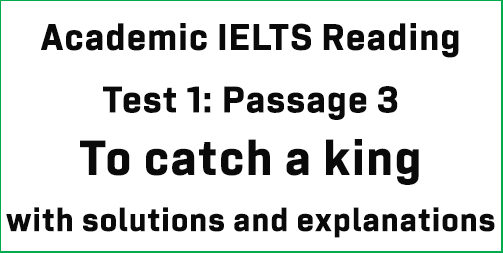
Academic IELTS Reading: Test 1 Reading passage 3; To catch a king; with best solutions and explanations
This Academic IELTS Reading post focuses on solutions to an IELTS Reading Test 1 Reading Passage 3 titled ‘To catch a king’. This is a targeted post for IELTS candidates who have great problems finding out and understanding Reading Answers in the AC module. This post can guide you the best to understand every Reading answer […]

IELTS General Training Reading: Test 2 Section 1; How to choose your builder & Island adventure activities; with complete solutions and best explanations
This General Training IELTS Reading post focuses on solutions to IELTS Cambridge 16 Reading Test 2 Section 1 which has two texts titled ‘How to choose your builder’ & ‘Island adventure activities’. This is a targeted post for GT IELTS candidates who have big problems finding out and understanding Reading Answers in the GT module. This […]
- Skip to primary navigation
- Skip to main content
- Skip to primary sidebar
- Skip to footer

IELTS Advantage
IELTS Preparation Courses
Education Vocabulary
Below are twenty words associated with one of the most common IELTS topics- education. They are represented visually and include meanings, form, synonyms, antonyms, collocations and example sentences.
I hope this will help you prepare for the IELTS test and please let me know if you have any suggestions for further posts.
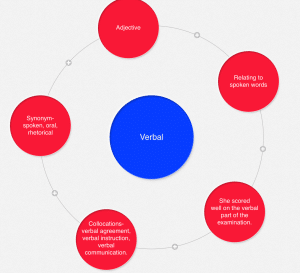
About Christopher Pell
My name is Christopher Pell and I'm the Managing Director of IELTS Advantage.
I started IELTS Advantage as a simple blog to help 16 students in my class. Several years later, I am very humbled that my VIP Course has been able to help thousands of people around the world to score a Band 7+ in their IELTS tests.
If you need my help with your IELTS preparation, you can send me an email using the contact us page.
Education: Advanced IELTS Language
The following vocabulary is from my IELTS ebook for part two of the writing test.
Rephrasing of some common topic words: children = juveniles, youngsters education= learning, instruction, acquiring knowledge students = pupils parents = caregivers, guardians, mothers and fathers schools = educational institutions society = community, citizens teachers = educators Some useful Nouns
Some useful verbs
Some useful Adjectives
2 thoughts on “Education: Advanced IELTS Language”
Very helpful. Interesting vocabulary. Thanks
Leave a Comment Cancel reply
Save my name, email, and website in this browser for the next time I comment.
About Mike I’m Mike Wattie from Australia. I have been teaching IELTS for over 20 years in Asia and Australia.
I have written IELTS books and this enables me to be an effective tutor. This is because I understand the main problems that students have taking the test and also the ways to overcome them.
Maybe you would like me to teach you the necessary skills and strategies to pass your test.
IELTS is a registered trademark of University of Cambridge ESOL, the British Council, and IDP Education Australia and they jointly manage the IELTS test. This website is for test preparation only and has nothing to do with the administration of IELTS tests This website is not affiliated, approved or endorsed by the University of Cambridge ESOL, the British Council, and IDP Education Australia.
Free IELTS lessons signup

- Academic practice
- General practice
- Task 1 Academic
- Task 1 General
- Task 2 (essay)
IELTS Speaking Vocabulary. Education
On this page you can find useful IELTS speaking vocabulary for Education topic, which will help you to speak coherently and fluently. Learn it to answer questions about education and achieve a high score on IELTS Speaking test.
See IELTS Speaking sample about Education >
- humanities : studies about human culture, such as literature, languages, philosophy, and history. Chloe excels in humanities subjects. She's adept at arts and languages.
- sciences : studies about the world, such as physics, biology, chemistry, and maths. Mark doesn't like scientific subjects, he's just too lazy to learn formulas.
- A for effort : a good mark, which is given someone for trying hard rather than for a success. Although I'm not the smartest in my group, I often get an A for effort, because I try hard.
- bachelor's degree : an undergraduate course which usually lasts 3 or 4 years. I will receive my bachelor's degree in two years.
- bookworm : a term to describe someone who really likes to read and spends a lot of time on it. I'm a real bookworm. I won't stop until the book is read.
- distance learning (e-learning) : education that takes place remotely, usually via the Internet. Distance learning is more flexible than traditional education, because students don't have to attend classes and can schedule their timetables as they want.
- eager beaver : an enthusiastic and hard-working person. My friend is an eager beaver. He studies everything with pleasure and gets great marks.
- face-to-face classes : a traditional way of studying - in a classroom with a teacher. When I was a kid, face-to-face classes had no alternatives, but nowadays a myriad of educational establishments offer online courses and individual tuition.
- higher education : education that is followed after high school. I plan on getting higher education after finishing school.
- hit the books : begin studying hard. I'm on my third year in the university, it is time to finally hit the books.
- individual tuition (private tuition) : instruction received individually or in a small group. Individual tuition is sometimes more effective than group work.
- intensive course : a course that offers longer and more frequent classes. A few years ago I took an intensive French course in the university.
- internship : a temporary position which students usually take to get work experience and practical knowledge. Before I went into design industry, I took an internship in a company.
- master's degree : a graduate course, which follows after bachelor's degree. Master's degree is often important to find a job with a higher salary.
- mature student : someone who's older than others. Nowadays it's not uncommon to face a mature student in the class. People often change professions and get a second or third degree in their mid-thirties.
- not the sharpest tool in the shed : a polite way of saying that someone isn't very smart. Maybe John isn't the sharpest tool in the shed, but he's a good friend nonetheless.
- public schools : exclusive independent schools in the UK. My friend finished a public school a few years ago.
- schoolboy error : a very basic and stupid mistake. Sam made a schoolboy error on his English test.
- single-sex schools : schools for either boys or girls. My brother studied in a single-sex school.
- small fraction : small part. A small fraction of students managed to pass this exam.
- state school : a school which is paid for by the state or country. It is hard to find a good state school nowadays.
- subject specialist : a person who is very talented in one specific field. My math teacher was a real subject specialist. Thanks to him math is my favourite subject now.
- teacher's pet : student whom teachers like the most. Hugo is a teacher's pet, he attends all classes and manages to get good marks with poor knowledge.
- three R's : basic educational skills ( r eading, w r iting, a r ithmetic). Pupils in a primary school study the three R's.
- to attend classes : to visit classes. In my college, students need to attend classes five times a week.
- to fall behind with studies : to progress less quickly than others. Mary was ill for two weeks, so she fell behind with her studies.
- to give feedback : to give some information or criticism on a subject. I launched a project a couple of days ago and I want my friends to give me some feedback.
- to goof around : spend time doing nothing important. Sometimes I like to goof around, although my parents scold me for that.
- to learn something by heart : to memorize something. Last year i had to learn a very big poem by heart for my literature class.
- to meet a deadline : to finish something within a time limit. Unfortunately, we weren't able to meet the deadline for our project.
- to pass with flying colours : to pass easily and with excellent result. I'm studying hard and I will pass IELTS with flying colours.
- to play truant : to skip classes without permission. During my school years I often played truant with my friends.
- to pursue studying : to continue studying. Lora would like to pursue studying in the future to become a professor.
- to set aside some time : to take some time. I need to set aside some time to collect my thoughts.
- to sit an exam : to take an exam. Tomorrow I'll have to sit a two-hour math exam.
- to take a year out : to spend one year working or traveling before studying in the University. My friend took a year out and went traveling to the UK.
- tuition fees : money you pay for your education. I had to pay tuition fees this summer.

Education 7+ IELTS vocabulary
Here are interesting words and collocations to use in your answers for IELTS topics about Education and Studying .
Education vocab — List of words and collocations
Education vocab — explanations & examples.

IELTS videos (tips, strategies, and mock tests):
Ielts speaking score 8.5 – india — ielts speaking videos, improve your ielts speaking in just 60 minutes — ielts preparation videos, 1 simple trick to become fluent in english — ielts preparation videos, canada pr express entry tips from an iccrc member — after-ielts videos, ielts speaking band 8.5 vietnamese - full with subtitles — ielts speaking videos, ielts newsletter.
- Skip to main content
IELTS Podcast
Pass IELTS with expert help.
IELTS Vocabulary: Vocabulary lists, exercises and free resources
Welcome to the IELTS Vocabulary page! If you’re preparing for the IELTS exam, you already know that a strong vocabulary is crucial for success.
Here we put together lists of topic-specific vocabulary and the way you can use them in the exam.
You’ll find detailed explanations and an IELTS vocabulary list to practice and improve your vocabulary.
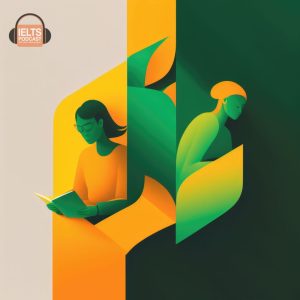
Table of Contents
How can i improve my vocabulary for ielts.
- Vocabulary for IELTS Speaking topics
Vocabulary for IELTS Writing Task
Video: how to expand your writing vocabulary (+ 10 words), what is a vocabulary collocation.
- Important Vocabulary to learn for IELTS
What is the best way to learn topic-specific collocations?
Video: ielts topic specific vocabulary and collocations, other ielts vocabulary lessons.
- Audio Tutorial
Vocabulary or lexical resource is responsible for 25% of your final grade, in both the speaking and writing sections.
Here we have a list of the topics you can expect to find on the exam, we are updating it each week.
It’s common to be stuck with an IELTS exam score of 6.5 and believe in order to get a band 7 they need to improve their IELTS vocabulary.
However, without feedback, evaluation or expert exam help, it is difficult to pinpoint exactly which area you need to get help for.
Constantly build your passive vocabulary word lists by reading and listening. Then move these words into your active vocabulary by using them when speaking or writing.
To improve faster, when reading, listening or watching English material, try to capture new words in a phrasebook. If you have time add the context too.
The next time you write an essay , review it and look for opportunities to add the words from your list into your text.
Likewise, when speaking try to incorporate your new vocab into your conversations, don’t force them though because it will sound odd!
Idioms can be extracted from films and English podcasts, however, I’d recommend audio material because there are no visual clues, making listening a little harder.
Active reading is a great habit to develop and a vital exam preparation skill. Active reading is where you circle, underline and mark the text you are reading, so as to ease comprehension.
If you want to accelerate your learning, have a look at some tutorials about vocabulary acquisition. This page includes how to use a vocabulary phrase book and flashcards.
Take a look at our article which will provide tips and strategies to improve your vocabulary .
Vocabulary for IELTS speaking topics
- Friends and family
- Food and nutrition
- Travel and tourism
- Modern technology
- Coronavirus vocabulary (new)
- Pollution and the environment
- People, personalities and characters
- Fitness and health
- School and education
- Work and careers
- University and student life
- Accommodation
- Books, film and art
- Climate change
- Working from home
- Social media
- Advertising
- Fashion and shopping
IELTS vocabulary for the writing section refers to the academic style and word choice (lexical resource) when writing your essay.
Below we have put together tutorials with word lists to help you improve your IELTS score.
- Vocabulary about climate change (word list included)
- Vocabulary: the environment (with Ted Talk and list of collocations)
- Vocabulary: sports topics (with Ted Talk and list of collocations)
- Vocabulary: globalisation – with Ted Talk presentation
- Vocabulary about law and order (word list included)
- Vocabulary: technology
- Vocabulary: politics with Ted Talk presentation
- Vocabulary: language and culture – with Ted Talk
- Vocabulary: health with Ted Talk presentation
- Vocabulary: education topic with Ted Talk and list of collocations
- Vocabulary about crime
- Vocabulary about employment and equal pay
- Vocabulary about fossil fuels
- Vocabulary about employment
- Vocabulary: employment and highly skilled jobs
- Vocabulary about sport with Ted Talk presentation
A collocation is a group of words that has an above-average possibility of being found together.
Using collocations in your writing and IELTS speaking helps to make your language sound more natural and fluent. This in turn makes your writing flow and helps you get a better scoring essay.
Important Vocabulary List to learn for IELTS
We have compiled a list of the most essential vocabulary words and phrases you need to know to perform well on the exam.
Our expertly curated list covers a range of topics commonly found on the IELTS exam, from education and technology to travel and the environment.
With our guide, you’ll be able to expand your vocabulary and improve your overall score on the IELTS.
Modern Technology
- Labour-saving devices
- State-of-the-art technology
- Internet-enabled
- Rocket scientist
- Computer crashed
- Shut down the computer
- Wireless hotspots
- Computer literate
- Hacking into the Internet
- Artificial intelligence
Global Warming
- Political issue
- Climate crisis
- Green consumer
- Carbon emissions
- Historical average
- Carbon footprint
- Climate solutions
- Current levels
- Global warming
- Environmental problems

Food and Nutrition
- Nutritious food
- Refined carbohydrates
- Food preparation
- Packed with vitamins
- Home cooked meal
- A balanced diet
- Daily consumption
- Savouring the food
- Seasonal fruits
- Homemade food
- Travel abroad
- Affordable travel
- Holiday destinations
- Out-of-season travel
- Exotic destinations
- Off the beaten track
- Self-catering accommodation
- Spectacular beaches and lush forests
- Travelling light
- Magnificent landscapes
Immigration
- Middle-income countries
- Western countries.
- Public opinion
- Increased movement
- Refugee group
- Multicultural society
- Global situation
- Developing world
- International community
- Immigration policies
The best way to learn topic-specific collocations is to look for them being used in context. We in the lists above, extracted collocations from Ted Talks , so you can identify how they are used in context .
Using topic-specific vocabulary, collocations and words from the academic vocabulary list will help considerably.
Below is a free PDF ebook of lexical resources with lots of vocabulary lists and examples to learn new vocabulary for your English language study. If you are still struggling then check out the Jump to Band 7 or its Free IELTS Course.
Click here for a free master list of collocations!
Elevate Your Writing with Online IELTS Essay Checker
Learning many words is good for the IELTS test. However, using them in essays can be tricky. Do you want to be sure your essays are the best they can be? We have a tool that can help you. It’s name? The online IELTS essay checker .
This tool is like a helpful friend. You give it your essay, and it tells you what’s right and what to fix. So, you can learn quickly. Another good thing? This tool can help you save money.
Many students pay a lot for classes and books to learn how to write. But our tool is not expensive and gives fast feedback. So, after learning new words on this page, use our online IELTS essay checker for your essays. It will show you how to use the words right.
In short, if you want to do well in writing and not spend too much money, our online IELTS essay checker is a good choice. It’s easy to use and can help a lot. We hope it helps you get a high score on your IELTS test. Keep learning and good luck!
- Improve your IELTS Writing vocabulary with these amazing tips
- Synonyms to improve your score in IELTS
- Writing and speaking vocabulary to improving your grammatical range and accuracy
- IELTS band 8 vocabulary and collocations
- Common idioms you can use in the IELTS speaking exam
- Writing task one: informal letter writing phrases
- Social Media Vocabulary
- How to use the right vocabulary in IELTS Writing
Audio tutorial
Podcast: Play in new window | Download
To improve your vocabulary you could get feedback from an ex-IELTS examiner , our service offers very detailed IELTS essay feedback on your vocabulary and word choice.
However, if you are on a budget and need instant feedback then try our online IELTS writing evaluation , fast and free!
Podcast: Play in new window | Download
- Practice Test
- Useful Tips – Tricks
- Full Writing Review
- General Writing Task
- Writing Task 1
- Writing Task 2
- Writing Exercises
- Writing Sample – Topics
- Writing Vocabulary
- Speaking Vocabulary
- Intro Question
- Speaking Part 1
- Speaking Part 2
- Speaking Part 2 – Audio
- Speaking Part 3
- IELTS Books
- Recent Exams
- IELTS Vocabulary
- Essay from Examiners
- IELTS Ideas
IELTS App - For Mobile
Ready for the IELTS exam with our IELTS app. Over 2 million downloads

Popular Last 24h
Describe a film that made you laugh, 138 common linking words for the ielts test, describe something difficult you would like to succeed in doing, [ebook] simon ielts writing task 1/ task 2 band 9, describe a person whom you met for the first time and made you happy, topic: experience is the best teacher, two-way discussion : status & ambition.
- IELTS Test/Skills FAQs
- IELTS Scoring in Detail
- Forecast Speaking – 2023
- List IELTS Speaking Part 3
- List IELTS Speaking Part 1
- IELTS Writing 2023 – Actual Test
Our Telegram
Join our community for IELTS preparation and share and download materials.
The information on this site is for informational purposes only. IELTS is a registered trademark of the University of Cambridge ESOL, the British Council, and IDP Education Australia. This site and its owners are not affiliated, approved or endorsed by University of Cambridge ESOL, the British Council, or IDP Education Australia.
Latest Articles
Ielts speaking part 3: topic relax, describe a place | where you go to relax, ielts speaking part 1: advertisements (audio), describe a place where you like to go shopping , describe an event you attended, most popular, in many countries,today there are many highly qualified graduates without employment..
ieltspracticeonline All Rights Reserved

25,000+ students realised their study abroad dream with us. Take the first step today
Meet top uk universities from the comfort of your home, here’s your new year gift, one app for all your, study abroad needs, start your journey, track your progress, grow with the community and so much more.

Verification Code
An OTP has been sent to your registered mobile no. Please verify

Thanks for your comment !
Our team will review it before it's shown to our readers.

- Study Abroad Test Prep /
List of Education Vocabulary IELTS
- Updated on
- May 30, 2023

Education Vocabulary IELTS : Vocabulary can act as a bridge between you and other individuals. With its help, you can express your thoughts/ ideas to the world and interpret what others are trying to convey. Insufficient vocabulary skills can hamper an individual’s social and professional growth. In essence, vocabulary might be the most important part of learning a new language. This is why, it should not be disregarded at all costs. And just like any other language, this condition is applicable to the English language as well.
Also Read: IELTS Sample Tests
List of IELTS Vocabulary on Education
Education is a fundamental aspect of our lives and takes up a major portion of the IELTS Speaking Assessment. While talking about education, you must keep abreast with the most commonly used vocabulary pertaining to the topic. During the assessment, candidates can be asked to describe or talk about their school, college or university.
Therefore, it is imperative for one to have a good hold of their ‘education’ lexicon (vocabulary) to ensure they do not get stuck during the assessment. The complexity of questions asked in the assessment can range from the simple ones stated before to more complex ones such as the quality of teaching or education system in your country, equal opportunities, technology in schools and many other related topics. The list of education vocabulary will equip you to create answers for these types of subjects as well.
Also Read: 5 Best Books for IELTS Vocabulary
Why is Vocabulary Important?
For students looking to pursue their education overseas, vocabulary—often referred to be the lifeblood of a language—can be a saving grace. A solid command of the language indicates that the student can communicate and talk more effectively. This is so that verbal expression can be coherent and organised when conveying intangible qualities like feelings or thoughts.
Communication may be the only means for students studying abroad to socialise with peers. In such cases, a strong vocabulary can allow them to communicate fluently and give them the confidence to express their feelings and views.
Importance of the IELTS Exam
Those who wish to study or reside abroad are required to undertake the International English Language Testing System (IELTS). This English language test is designed to ascertain and assess a candidate’s general proficiency in the language, particularly in the areas of reading, writing, listening, and speaking.
To ace the IELTS Exam, you must have strong vocabulary, spelling, and pronunciation skills. Candidates must be proficient in vocabulary because it makes up a sizable amount of the reading, listening, and writing sections. Many of you may find the exam challenging or burdensome, but with adequate study and practice, you should ace it.
It could be difficult for students who struggle with English to study abroad or immigrate to an English-speaking nation. However, this does not negate the possibility of enhancing one’s English speaking, reading, and writing skills. In order to pursue an overseas education, students must perform well in the IELTS exam. Participation in the aforementioned exam by the applicant may serve as evidence of their command of the English language.
High IELTS scores may assist students in :
- Showcasing their English language abilities to the admissions committee and visa authorities.
- Highlighting the candidate’s ability and capacity to speak in front of a worldwide audience.
One needs to have a strong command of the English language in order to ace the IELTS exam. One must develop the practice of using new words/phrases as efficiently as possible in their everyday conversations if they want to expand their vocabulary. Having said that, expanding one’s vocabulary involves more than just learning new words; it also entails creating a habit of using them frequently. Vocabulary, which is considered the essence of a language, can be a lifeline for students looking to study abroad. An individual who has a solid command of the language is likely to be able to talk and communicate more successfully.
For the latest blogs on IELTS Exam, stay tuned to our page and don’t forget to follow us on Instagram , Facebook , Twitter , and Linkedin .
Shubham Das
Shubham Das has been working as an educational content writer for the past two years and has a background in filmmaking & screenplay/ teleplay writing. He is fascinated by the human psyche, literature and cinema.
Leave a Reply Cancel reply
Save my name, email, and website in this browser for the next time I comment.
Contact no. *

Connect With Us
25,000+ students realised their study abroad dream with us. take the first step today..

Resend OTP in

Need help with?
Study abroad.
UK, Canada, US & More
IELTS, GRE, GMAT & More
Scholarship, Loans & Forex
Country Preference
New Zealand
Which English test are you planning to take?
Which academic test are you planning to take.
Not Sure yet
When are you planning to take the exam?
Already booked my exam slot
Within 2 Months
Want to learn about the test
Which Degree do you wish to pursue?
When do you want to start studying abroad.
January 2024
September 2024
What is your budget to study abroad?

How would you describe this article ?
Please rate this article
We would like to hear more.
Have something on your mind?

Make your study abroad dream a reality in January 2022 with
India's Biggest Virtual University Fair

Essex Direct Admission Day
Why attend .

Don't Miss Out
- A Beginner’s Guide to IELTS
- Common Grammar Mistakes [for IELTS Writing Candidates]
Writing Correction Service
- Free IELTS Resources
- Practice Speaking Test
Select Page
IELTS Vocabulary
Posted by David S. Wills | Nov 7, 2022 | IELTS Tips | 0
I’ve been teaching IELTS since 2010 and have run this website since 2016 and in all that time the most common thing people want to know is how to learn IELTS vocabulary .
To be honest, I don’t believe there is such as thing as IELTS vocabulary and that’s what I always tell people. IELTS is an English test and so you just need to learn English! However, people don’t like to hear that.
My best advice about learning IELTS vocabulary is to look at common IELTS topics (like education, technology, the environment, health, etc) and then read lots of articles on those subjects. By doing that, you will naturally encounter new words, which you can look up and learn. I have a great guide to effective vocabulary learning here .
I also try to produce sample answers for both speaking and listening questions and whenever I do that, I highlight useful words and phrases. That’s another good way to learn IELTS vocabulary.
Still, since people are quite insistent upon learning vocabulary for IELTS and they seem to believe that there is a big list of necessary words, then I will try to make one below! Keep in mind, though, that none of those is really required. These are just some words that might be useful in certain contexts. I will group them by topic, which I think is the best way to learn.
Education Vocabulary
- Certification
- Curriculum (plural: curricula)
- Distance learning
- Extracurricular
- Qualification
- Technical college
- Tertiary education
You can learn more in this extensive guide to the IELTS topic of education.
Environment
- Carbon dioxide
- Climate change
- Fossil fuels
- Global warming
- Greenhouse gases
- International cooperation
- Nuclear power
- Pollution / pollutants
- Sea level rise
- Solar power
- Sustainability
You can learn more about the environment in this article .
- Carbohydrates (informal: carbs)
- Ethically sourced
- Health food
- Saturated fats
I have a lesson on food here . You can find out how to talk about restaurants here .
- Alternative treatments
- Cardiovascular
- Emergency room
- Healthcare provider
- Health service
- Mental health
- Obesity
- Preventative treatment
- Vaccinations
There is much more about the topic of health here .
- Cloud computing
- Cryptocurrency
- Digitisation
- Social media
There’s much more about technology in this article . You can also watch this video lesson for more IELTS vocabulary related to technology.
- Career advisor
- Customer service
- Industrial action
- Interpersonal skills
- Negotiation
- Résumé
- Training session
- Working from home
Words to Avoid in IELTS
So far, I’ve listed lots of potentially useful IELTS vocabulary (although remember that there’s no such thing – these are just words you might find helpful!) but now I want to share a few words that you really ought to avoid or at least use with extreme caution.
People who follow this blog and also my social media channels will know that I loathe the word “plethora.” It can be used correctly, but a really awful IELTS teacher from India has promised her millions of followers that using it will magically get them a band 8! As a result, this has become a bit of an IELTS cliché. I’ve written about this and other words here .
I also have a video about IELTS phrases that should be avoided:
Here’s a short list of some that you need to avoid or be careful with:
- It cannot be denied…
- Recapitulate
Just as there is no such thing as “IELTS vocabulary,” but rather a whole language you should try to master, even these words can be used correctly. In my experience, however, having marked over 20,000 IELTS essays, I find them to be used incorrectly in most cases.
Remember this advice as we finish this article on IELTS vocabulary:
Don’t try to impress the examiner with advanced words. Instead, aim for accuracy.
That’s the best advice I can give you and, if you follow it and study hard, you should get a great score for Lexical Resource .
About The Author
David S. Wills
David S. Wills is the author of Scientologist! William S. Burroughs and the 'Weird Cult' and the founder/editor of Beatdom literary journal. He lives and works in rural Cambodia and loves to travel. He has worked as an IELTS tutor since 2010, has completed both TEFL and CELTA courses, and has a certificate from Cambridge for Teaching Writing. David has worked in many different countries, and for several years designed a writing course for the University of Worcester. In 2018, he wrote the popular IELTS handbook, Grammar for IELTS Writing and he has since written two other books about IELTS. His other IELTS website is called IELTS Teaching.
Related Posts
How to Save Time in IELTS Reading
February 15, 2021
Describe a Foreign Country: Speaking Part 2
February 22, 2018
How to Improve from Band 6.5 to 7 in IELTS
August 31, 2020
IELTS Writing Task 1 Practice Activity
July 6, 2017
Leave a reply Cancel reply
Your email address will not be published. Required fields are marked *
This site uses Akismet to reduce spam. Learn how your comment data is processed .
Download my IELTS Books
Recent Posts
- Past Simple vs Past Perfect
- Complex Sentences
- How to Score Band 9 [Video Lesson]
- Taxing Fast Food: Model IELTS Essay
- Airport Vocabulary
Recent Comments
- Daisey Lachut on IELTS Discussion Essays [Discuss Both Views/Sides]
- David S. Wills on Describe a Historical Period
- Siavash on Describe a Historical Period
- fabliha on IELTS Speaking Partners
- tufail khan on IELTS Discussion Essays [Discuss Both Views/Sides]
- Lesson Plans
- Model Essays
- TED Video Lessons
- Weekly Roundup
Study Abroad
Scholarships
Vocabulary Words for IELTS 2024: Complete List Phrasal Verbs, Idioms and Words
Updated on Mar 18, 2024, 13:21
Words are the building blocks of any language! Interestingly, they keep evolving. New words form, and old words coin new meanings that are more relevant to the age and day.
A pro-English speaker would know how to play and experiment with vocabulary in all four language skills: Reading, Speaking, Listening, and Writing. This is why IELTS Vocabulary is crucial in deciding your IELTS band score!
On This Page

1. IELTS Vocabulary: What’s It All About?
On this page, we’ll assist you with the best IELTS vocabulary to add to your word bank. Let’s dive in!
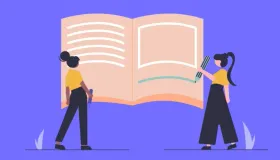
2. IELTS Vocabulary List: Phrasal Verbs
Phrasal verbs are a combination of verbs and prepositions or adverbs. Most times, phrasal verbs don’t mean what they indicate, LITERALLY! For example, the phrase ‘look after him’ does not indicate that you must look behind or after the person has walked past or moved.
Instead, it means “take care of him.”

3. IELTS Vocabulary List: Idioms
Idioms, much like phrasal verbs, don’t always indicate what they mean. Idioms are flowery sentences framed together for effect, humour and poetry. Idioms originate from cultural experiences or historical references.
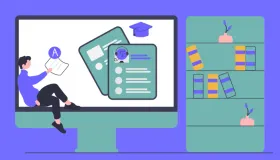
4. Tips To Improve IELTS Vocabulary
IELTS Vocabulary only improves over time. You must put in consistent work and practice to improve your word bank.
More for you
Check your IELTS band in 10 mins!
IELTS Vocabulary: What’s It All About?
By definition, vocabulary just means words! But remember, it does not have to be just a word. IELTS Vocabulary consists of idioms or phrasal verbs, which we’ll explore below.
As part of language evaluation, IELTS measures your vocabulary range, also called ‘Lexical Resource.’ This band descriptor accounts for 25% of your IELTS scores.
Here’s what it checks:
- Are you using the right words in the proper context?
- Are you following all the grammar rules when using this word?
- Are you able to use unusual and uncommon words relevantly?
IELTS Vocabulary is put to use differently in each of the four skills. For instance, the IELTS Speaking Vocabulary will consist of conversational words, nothing too over-the-board or academic.
On the other hand, while preparing for IELTS Reading, Writing or Listening, you will need to add more sophisticated words to your bank! This is because the passages, audio and essay topics are slightly more academic/formal in nature.
Therefore, your preparation strategies for IELTS Vocabulary should be specific to the section you’re preparing for.
Below is a list of vocabulary words arranged as per categories/topics that most commonly occur in IELTS.
Advertising
Culture, arts, and diversity.
- Environment
- Personality
IELTS Vocabulary List: Phrasal Verbs
Understanding phrasal words can be tricky to start with, but as you learn, it will become easier, more interesting, and even fun!
Here are some phrasal verbs you can start using today!
Commonly Used Phrasal Verbs
Less common phrasal verbs, ielts vocabulary list: idioms.
For example, when someone says, “This is a piece of cake!” They are not talking about a real slice of cake. They are simply implying that this (some task) is very easy to do.
Usage of Idioms indicates a high level of expertise in the English language, which is why using them during IELTS may get you brownie points!
Here are some Idioms to learn today!
Common Idioms
Less common idioms, tips to improve ielts vocabulary.
To score well in the lexical resource part of the test, it’s important that you not only know the words but understand them and can pronounce them correctly. Here are the top 5 tips to help you improve Vocabulary words for IELTS!
- Read all you can: The best way to learn new words is to read! Read newspapers, books, magazines, blogs, and anything else. If you spot a new word, note it and find its meaning.
- Watch and Observe: When watching TV shows or movies or chatting with people, pay attention to the words used. It's an easy and effective way to learn new vocabulary without much effort!
- Play word games: Another easy trick if you have little time to build your vocabulary. Games like Wordle and Scribbl are fun plus educative.
- Practice: Learning a new word is not enough. You must practice using it in different contexts. You should also practice pronunciation!
- Set Goals: If vocabulary is your weak point, try setting goals to learn a certain number of words every week. Maintain a journal to record the words and track your progress.
IELTS Practice Test
IELTS Modules
IELTS Important Information
IELTS Exam Date
IELTS Exam Fee
IELTS Listening Practice Test
IELTS Speaking Practice Test
IELTS Reading Practice Test
IELTS Writing Practice Test
IELTS Test Centres
IELTS Results
Types of IELTS
IELTS Pattern
IELTS Exam Eligibilty
IELTS Slot Booking
IELTS Band Score
IELTS Registration
IELTS Books
IELTS Preparation
IELTS Accepting Countries
Study In USA
Study In Canada
Study In UK
Study In Australia
Study In Ireland
IELTS Accepting Universities
Massachusetts Institute Of Technology
The University Of British Columbia
Harvard University
University Of Toronto
Conestoga College
University Of East London
Stanford University
University Of Alberta
Coventry University
New York University
Related Articles

60+ IELTS Essay Topics 2024: IELTS Writing Task 2 Samples & Tips
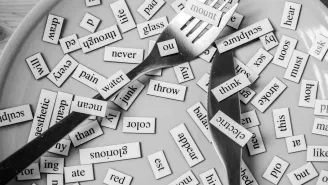
Idioms for IELTS Speaking Test 2024

Latest IELTS Writing Task 1 2024: Vocabulary & Bar Chart
Q. Is there any IELTS vocabulary test?
A. No, the IELTS exam does not have a specific vocabulary test. However, a strong and diverse vocabulary is essential for performing well across all sections. You are encouraged to explore our list of vocabulary words for IELTS as a valuable resource to enhance your language proficiency.
Q. Is 7.5 a good score?
A. Yes, a score of 7.5 reflects a high level of proficiency in English. It demonstrates that the candidate can communicate effectively in academic and professional contexts. This score is widely accepted by universities worldwide, making it a commendable achievement for individuals aspiring to pursue higher education or professional opportunities in an English-speaking environment.
Q. Are vocabulary words for IELTS important?
A. Yes, vocabulary words for IELTS are crucial as they constitute up to 25% of the total score. This emphasis underscores its significance in both the Speaking and Writing sections, making it essential for candidates to focus on building a diverse and accurate vocabulary to enhance their chances of success.
Q. How do you enrich your IELTS vocabulary?
A. To enhance your knowledge about vocabulary words for IELTS, engage in activities such as reading newspapers, which exposes you to diverse vocabulary used in real-world contexts. Watching English movies with subtitles enhances your listening skills and introduces you to colloquial expressions. Maintaining a daily diary and jotting down new words and phrases encountered during your studies or daily life aids in continuous learning and retention.
Q. Is it necessary to use vocabulary words for IELTS?
A. No, there is no strict rule that using complex words is necessary for scoring well in IELTS. While using a diverse vocabulary is encouraged, there is no obligation to incorporate unnecessarily complex words. The key is to prioritise effective usage and understanding of words. The emphasis should be on practical communication rather than the complexity of the vocabulary.
Q. Why is it important to improve vocabulary words for IELTS?
A. Yes. Vocabulary is your foundation. Vocabulary makes up to 25% of your total IELTS Writing and Speaking marks. Without a strong vocabulary, having an efficient conversation or writing a good content piece is difficult. And when you move out to an English-speaking country, it is ideal to build a strong vocabulary.
Q. What is the best way to memorise vocabulary words for IELTS easily?
A. We don’t recommend memorising words, as it is highly likely to lead to confusion. Using words in the wrong context will cost you marks. However, if it is your last resort, using mnemonics is the best way to memorise vocabulary. These are mental shortcuts that help you remember more complex concepts or words. For example, you can create connections between words. The longer you think about acronyms or the connection, the better you will remember the associated words.
Q. Why is vocabulary important in the IELTS exam?
A. Having a good vocabulary helps you express ideas clearly without repeating yourself. In Writing, it lets you share complex thoughts and makes your points easier to follow. In Speaking, it helps you speak fluently and sound confident. In Listening and Reading, vocabulary practice will help you easily comprehend the audio and passages.
Q. How can I expand my IELTS vocabulary?
A. These are a few things you can do to improve your vocabulary:
- Read genres, including newspapers, articles, and academic texts. This exposes you to a wide array of words used in diverse contexts.
- Practice actively using new words in different situations, ensuring a solid understanding of their nuances.
- Additionally, make use of vocabulary-building tools such as word lists and flashcards. Consistent and deliberate efforts in these areas will contribute significantly to the gradual expansion of your IELTS vocabulary.
Q. Are there specific words I should focus on for IELTS?
A. You can focus on the following categories as they are common subjects in all the four sections of IELTS:
- Advertisement
- Covid-19
Q. Can I use informal words in the IELTS exam?
A. While informal words may be a part of everyday communication, the IELTS exam demands a higher level of formality and precision. Using informal language may detract from the overall academic tone expected in both written and spoken responses. Therefore, you are encouraged to adhere to a formal register, showcasing your ability to communicate proficiently in settings requiring more polished and professional language use.
Q. How can I memorise new words effectively?
A. Establish associations between new words and familiar concepts to make memorisation more effective. Creating a story around a group of words can help you recall your memory. Furthermore, practice actively using the words in sentences, integrating them into your daily language use. This approach solidifies your understanding of the words and enhances your ability to recall and employ them appropriately during the exam.
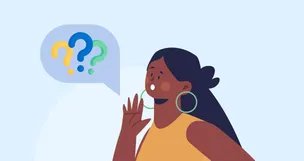
International Programs
- Corporate Education
Intensive ESL
Prepare for university-level study, career advancement, or for the accomplishment of personal goals in our academically-oriented Intensive English as a Second Language Program.
Program Benefits
- Experience a program trusted for more than 40 years to help you achieve your academic, career, and personal goals
- Learn from highly-trained teachers with an average of 10+ years of teaching experience who are committed to the highest standards of student achievement
- Attend small classes, typically about 16 students
- Benefit from engaging, interactive classes with a rigorous curriculum that emphasizes authentic language use in academic, business, and social contexts. Information about course levels and proficiency scales
- Advance your skills in upper-level elective classes in topics such as idioms, advanced pronunciation, advanced conversation, business English, advanced vocabulary, advanced grammar, and iBT and IELTS preparation
- Practice your English and learn about campus life with a UCI undergraduate friend through conversation lunch hour held twice a week
- Learn using state-of-the-art technology and methodologies
- Prepare to score higher on the TOEFL and IELTS tests
Eligibility and Requirements
- Available to students 17 years and older at all levels of English proficiency
- To attend this program full-time, you are required to obtain an F-1 student visa
- Our 10-Week Intensive ESL program is also suitable for students who want to combine part-time English study with a holiday abroad. If you are coming to the U.S. mainly for tourism, and you want to take English language classes for your own pleasure or recreation, then a tourist visa (B-2) or Visa Waiver (WT) is appropriate
Is your goal to boost your TOEFL or IELTS score?
Learn skills and strategies that will help you improve your IELTS and TOEFL scores. At all levels of the 10-Week program, develop skills that are not only vital for success on the iBT TOEFL and IELTS, but also essential in your real-life use of English for your future.
Program Costs
Part-time Tuition:
- Grammar/Writing 1-5 or Reading/Writing 6-7: $1,875
- Speaking/Listening 1-7: $1,875
- Reading/Vocabulary 1-5: $1,250
- ESL Elective: $825
Meet Our Graduates
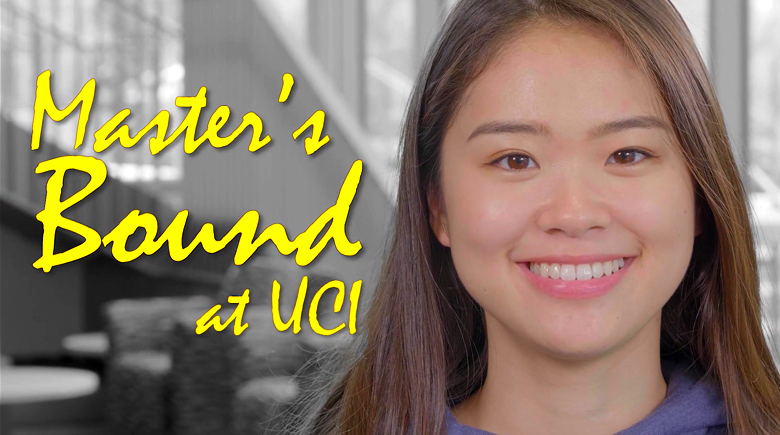
Fill out the following form to stay up-to-date on related courses, programs, and events.
Provide your contact info and we’ll send a toolkit with useful info, such as webinars, white papers, videos, and other related info.
*Certificate Tuition (full-time)
Approximate Total Cost: $10,500 (reflects full estimated expenses for completing the program, tuition included). See Program Costs below for part-time tuition costs.
Have Questions?
Talk to an enrollment coach.
Call: (949) 824-5414 Monday - Friday, 9am - 4pm (Pacific)
Frequently Asked Questions
Classes meet Monday through Friday at various times between 09:00 and 17:00 (California time) with a minimum of 18 hours of instructor-taught class time per week for full-time students. Students will learn their specific class times when they enroll.
Please visit Program Dates for available intakes.
ESL students who do not require an F-1 student visa may study part-time.
An F-1 student visa is required for full-time, on-campus study. You may study part-time with a tourist (B-1/B-2) visa or another visa status that allows for part-time study. However, you may not be enrolled in more than 17 hours of classes per week. If you are not sure if your visa status allows for part-time study, please contact an international student advisor at [email protected] for more information.
This program is only offered on campus. However, we offer UCI ESL courses on Coursera .
- Skip to primary navigation
- Skip to main content
- Skip to primary sidebar
IELTS with Fiona
IELTS preparation made easier
Full Members Academy Log in
IELTS Listening: MAPS and complex directions
By Fiona on March 24, 2024
IELTS candidates often get lost with maps.
This is because most coursebooks teach only very basic vocabulary for directions (turn left, go straight on etc).
This lesson will prepare you for more complex instructions, which I've never seen on any other IELTS website, but I see all the time in the Listening Tests.
In this lesson you'll learn:
- Basic prepositions of place
This lesson includes a 25-minute videos with 21 real examples with explanation from Books 10 - 18.
Thank you for your interest in my IELTS lessons and tips.
Come and join the Bronze Membership to access this fabulous lesson and lots more.
For just $9, you'll get access to 165+ IELTS lessons for a month (cancel any time).
Learn more Login

IMAGES
VIDEO
COMMENTS
Other Useful Vocabulary for Education. literate = to be able to read and write. illiterate = unable to read and write. the literacy rate = the percentage of people in a country or region able to read and write. comprehensive education = a well-rounded, broad education covering a variety of subjects.
The education vocabulary list contains words and phrases relevant to all parts of the IELTS exam. Finally, at the bottom of the page I've added links to topical articles, short videos and podcasts that will help you to improve both your education vocabulary and your reading and listening skills. Let's begin with the sample questions.
Education is common topic in IELTS. This vocabulary will help you with all parts of the test if the topic arises. As with the other vocabulary on these pages, although common word forms are given, not all word forms are here, so remember that once you understand the word you should study it further to make sure you understand exactly how it is ...
Higher education vocabulary exercise - Use no more than two words from the vocabulary above to complete the sentences. You may need to change the tense of the words. Exercise 2. 1. ________________in groups is often difficult because you are reliant on all team members remembering their part of the speech. 2.
IELTS topic vocabulary: education. All components of the IELTS exam are heavily focused on vocabulary. To help you improve your education vocabulary for the IELTS speaking test, we have compiled a list of terms. Remember that IELTS vocabulary should be quite formal, and you will get a higher score for using less common collocations and phrases.
Vocabulary: Education Topic Below is useful vocabulary with audio for the topic of education for both school and university. These are the most common words and collocations which you will need to learn in order to talk or write about school or university successfully. After each section of vocabulary, there are exercises
higher education: education, usually in a college or university, that is followed after high school or secondary school. an intensive course: a course that offers lots of training in order to reach a goal in as short a time as possible. to keep up with your studies: to not fall behind. to learn something by heart: to memorize it.
Common Phrases and Idioms on education for IELTS Speaking Topic:Education. 1. State school: a school paid for by public funds and available to general public. Example: Because my budget is limited, then get a scholar ship and go to state school is a great idea. 2.
Vocabulary words related to education and definitions: authentic: real, true. old-school strict: traditional learning with punishments and controlling teachers. teacher centred: where the teacher is leading the class. encourage collaboration: learning together through discussions. pressure to meet deadlines: having to finish work by a certain ...
Here, IELTS candidates can learn and practice education-related words and phrases. All the words are given here with definitions/meanings and their use in example sentences. This vocabulary list will help you write essays and speak on education, education-related problems and their solutions etc. Vocabulary list on 'Education':
Education and Learning Vocabulary. Education and learning - the two pillars that form the foundation of human development and societal progress. Irrespective of the context, be it academic essays or everyday conversations, it's crucial to express our thoughts and experiences in these areas accurately and effectively.
Education Vocabulary. Below are twenty words associated with one of the most common IELTS topics- education. They are represented visually and include meanings, form, synonyms, antonyms, collocations and example sentences. I hope this will help you prepare for the IELTS test and please let me know if you have any suggestions for further posts.
Vocabulary for IELTS Writing: Topic Education. 2565. By IELTS Practice Online. This is a really broad topic - and a very popular one in IELTS. Any part of IELTS can challenge you with questions related to education. We therefore need to focus on this topic as well. Let's start with the types of education.
The following vocabulary is from my IELTS ebook for part two of the writing test. Rephrasing of some common topic words: children = juveniles, youngsters. education= learning, instruction, acquiring knowledge. students = pupils. parents = caregivers, guardians, mothers and fathers. schools = educational institutions. society = community, citizens.
To continue the IELTS vocabulary series for IELTS Speaking, this post will cover vocabulary about education, which could be useful for you when encountering the topic in real life situation or in the IELTS exam. Now take a look at the vocabulary sets below, and pay close attention to the details presented for each word or phrase.
Education. On this page you can find useful IELTS speaking vocabulary for Education topic, which will help you to speak coherently and fluently. Learn it to answer questions about education and achieve a high score on IELTS Speaking test. humanities: studies about human culture, such as literature, languages, philosophy, and history.
Education vocab — Explanations & Examples. #412. bookworm (n) — someone who like reading and spend a lot of time on it. In my school time I was kind of a bookworm. Education. #455. curriculum (n) — group of subjects studied in a school, college, etc. Schools must include environment studies in their curriculum.
In this article, I am going to tell you all about education and IELTS. As you know (if you follow this website), the best way to learn new vocabulary is to study in terms of topics. There are many IELTS topics, such as environment, space, sports, health, and crime. We have talked about education many times in the past but today I will devote a ...
Audio Tutorial. Vocabulary or lexical resource is responsible for 25% of your final grade, in both the speaking and writing sections. Here we have a list of the topics you can expect to find on the exam, we are updating it each week. It's common to be stuck with an IELTS exam score of 6.5 and believe in order to get a band 7 they need to ...
12 Vocabulary for IELTS Writing Task 2 - u001dTopic Education. 4372. By IELTS Practice Online. 1. Tertiary education (n) Example: Students having access to tertiary education might have better job opportunities. Related collocations: To pursue tertiary education. To have access to tertiary education.
List of IELTS Vocabulary on Education. Education is a fundamental aspect of our lives and takes up a major portion of the IELTS Speaking Assessment. While talking about education, you must keep abreast with the most commonly used vocabulary pertaining to the topic. During the assessment, candidates can be asked to describe or talk about their ...
IELTS is an English test and so you just need to learn English! However, people don't like to hear that. My best advice about learning IELTS vocabulary is to look at common IELTS topics (like education, technology, the environment, health, etc) and then read lots of articles on those subjects. By doing that, you will naturally encounter new ...
IELTS Vocabulary is put to use differently in each of the four skills. For instance, the IELTS Speaking Vocabulary will consist of conversational words, nothing too over-the-board or academic. On the other hand, while preparing for IELTS Reading, Writing or Listening, you will need to add more sophisticated words to your bank!
At all levels of the 10-Week program, develop skills that are not only vital for success on the iBT TOEFL and IELTS, but also essential in your real-life use of English for your future. Program Costs. Part-time Tuition: Grammar/Writing 1-5 or Reading/Writing 6-7: $1,875; Speaking/Listening 1-7: $1,875; Reading/Vocabulary 1-5: $1,250; ESL ...
In this IELTS Listening lesson, you'll learn about more complex directions in maps. ... IELTS Vocabulary (22) ... the British Council, and IDP Education Australia. This site and its owners are not affiliated, approved or endorsed by the University of Cambridge ESOL, the British Council, and IDP Education Australia. ...
2 likes, 0 comments - ielts_tute on March 20, 2024: "#learnenglish #vocabulary #canada #grammar #ieltsspeaking #englishteacher #education #ieltsexam #visa #englishvocabulary #ieltswriting #i ...